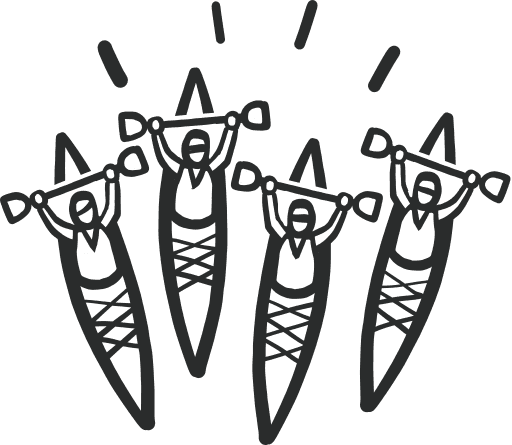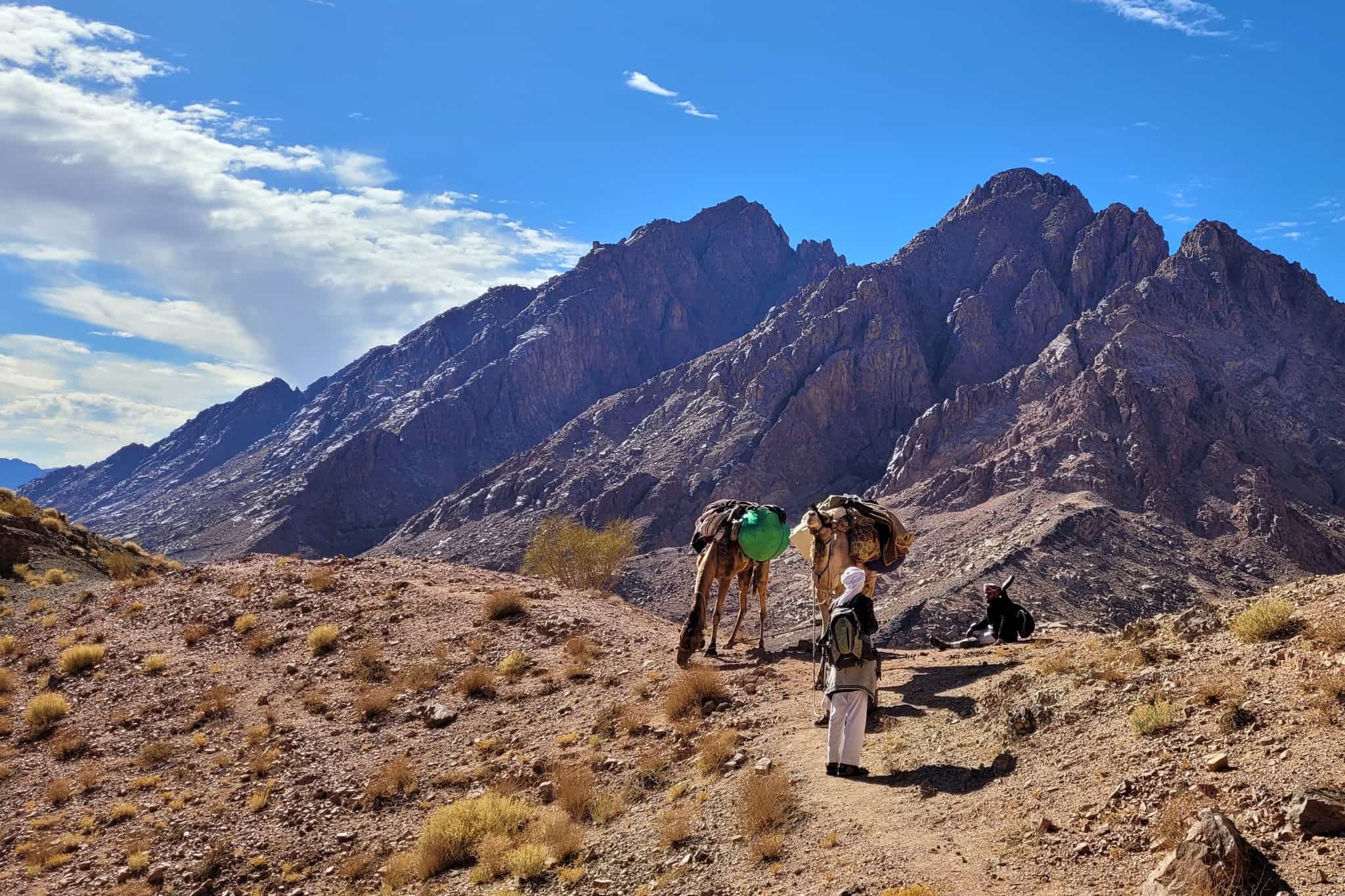
Nomadic Trek Through Egypt's Sinai Desert
Follow ancient trails with Bedouin nomads for a wild expedition through the valleys and mountains of the South Sinai Peninsula
What's Included?
Activities & Certified Guides
All itinerary activities with expert, English-speaking Bedouin guidesAll accommodation
5 nights wild camping and 2 nights in a hotelMeals
All your meals are included throughoutTransfers & Porterage
Airport and local transfers; camels to carry your overnight luggage and supplies during the trekEquipment
Carpets will be provided for wild camping in the desertSmall Like-minded Groups
Solo-friendly by design, join our small n’ sociable groups of up to 14 like-minded, active and outdoorsy people…
…
What's it like?






























Hike through the desert landscape via boulder-strewn wadis, dramatic switchbacks, remote ravines and lush oases
Scramble to the jagged summit of Jebel Um Shomer (2587m) for spectacular vistas across arid peaks and the Red Sea
Learn the traditional desert way of life from nomadic Bedouins, cooking over fire and sleeping under the Milky Way
Explore Sinai further by combining with our adventure Rock Climbing, Hiking and Snorkelling in Egypt
Key Information
Day 1
Welcome to Egypt!
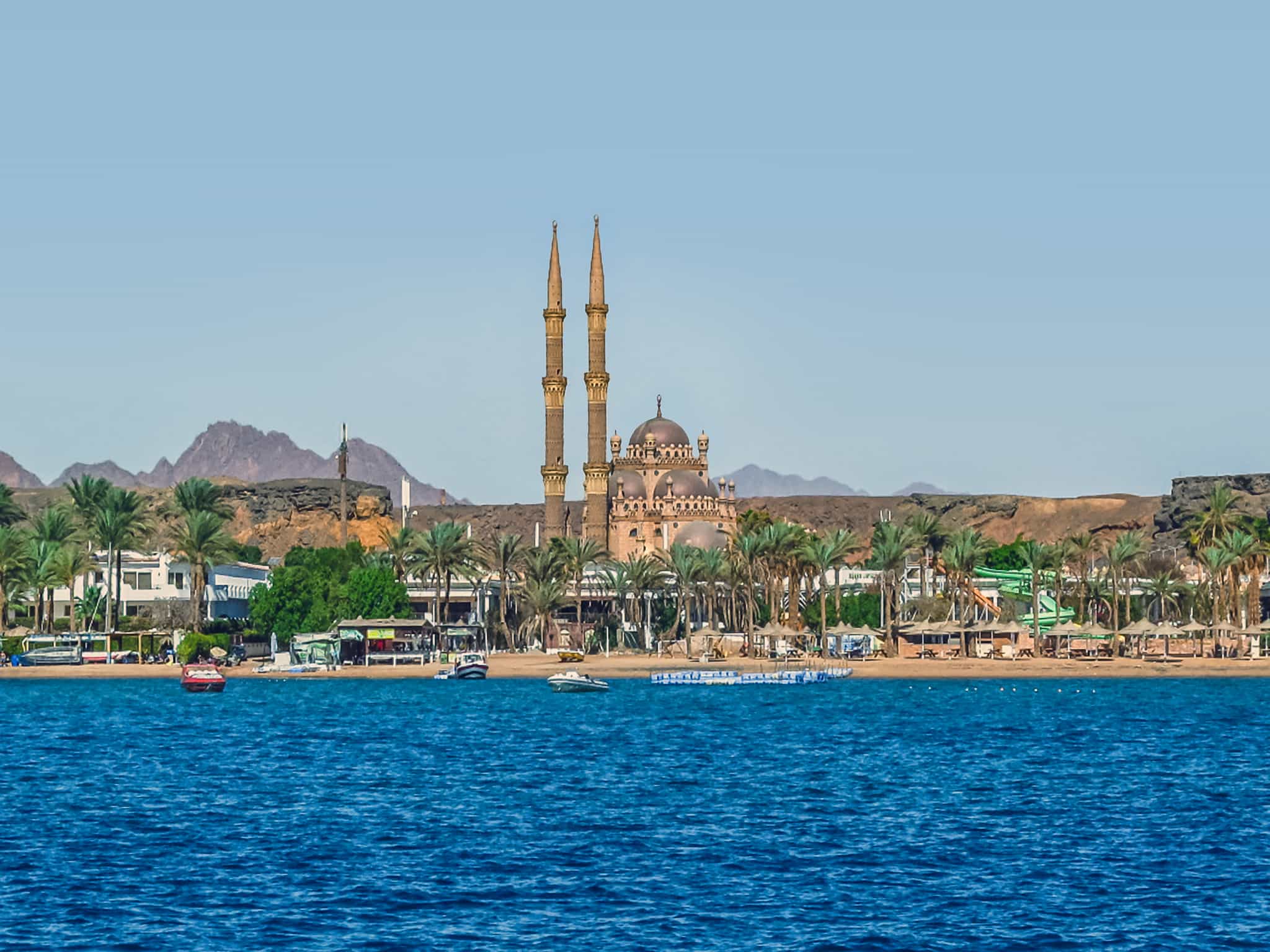
Your host will meet you at Sharm El Sheikh airport and transfer you to Sharks Bay Umbi, a relaxed family owned hotel from where you can enjoy your first glimpse of the Red Sea. If you are arriving early, you can arrange an optional visit to Nabq Protected Reserve – the world’s northernmost mangrove area, the edges of which can be explored with careful wading. Kick off your adventure with a group dinner and welcome briefing, then enjoy a good night's sleep and get ready for the epic desert expedition to come.
Day 2
Into the desert
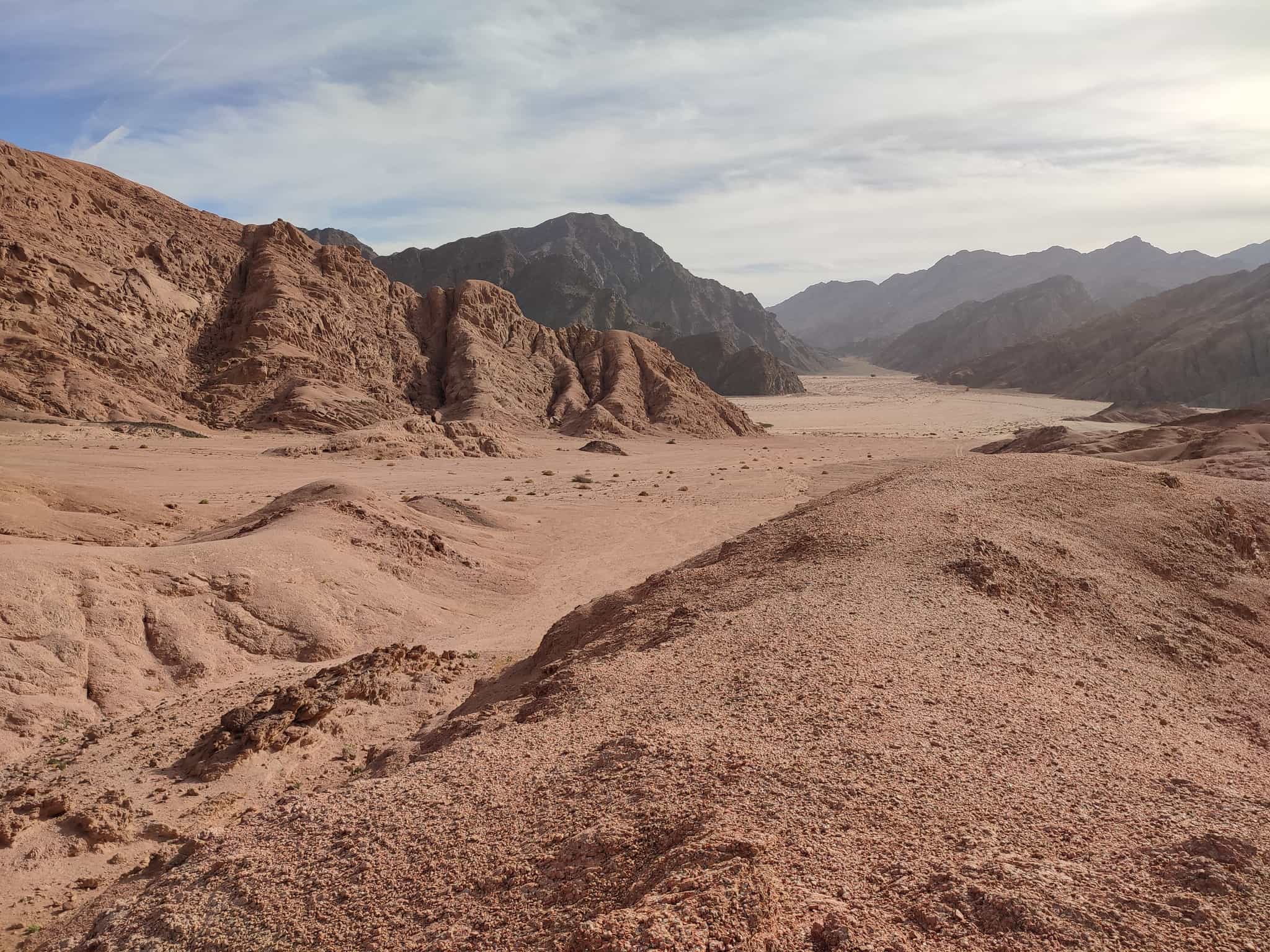
Hiking
After breakfast, pack the supply vehicles and head into the Sinai Desert. Travel off-road by Jeep to Ein Um Saieda to meet your friendly Bedouin team, and help load the support camels with water and the rest of the equipment. Then, you’re off! Follow an undulating path through El Homer to the top of Om Rajoum, where you can rest for a bit and soak up the views. Descend to Naqb Al Jamoose via a zig-zagging trail which connects two very distinct sections of the desert. Finish your hike through a beautiful section of soft sand. Camp in Wadi Isla during the longer summer days, or at Am Saqr during shorter winter days, enjoying your first night in the desert wilderness under a star-studded sky.
Day 3
Trek Wadi Rimhan
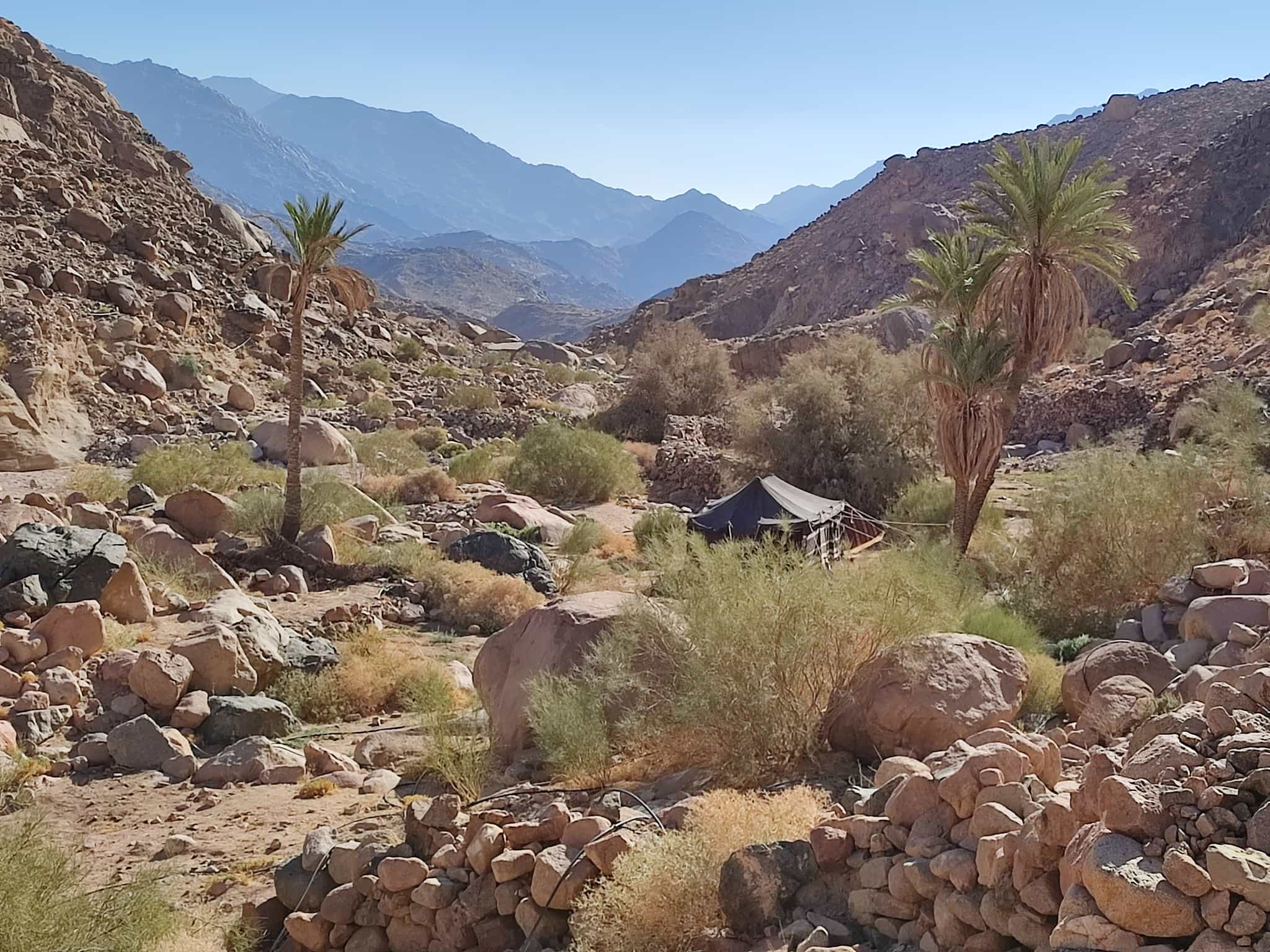
Hiking
Today's hike is all about Wadi Rimhan. At times tracking a steep ravine, at others a gentler path, this wadi (valley) ascends from Aqsuraya to the base of Um Shomer. Its position means that it catches any rainfall off most of Um Shomer and surrounding peaks, so despite just two or three rainfalls annually, this is as lush as it gets in the desert. Wind your way through Tarfa trees as the camels munch on grasses, stopping for lunch in Zalaga. Reach Crum Nassir late afternoon, an old Bedouin stone house and garden that will become your base for the next two nights. Help your Bedouin guides set up the camp and cook dinner, then get some rest – as tomorrow's summit challenge awaits.
Day 4
Summit Jebel Um Shomer (2587m)
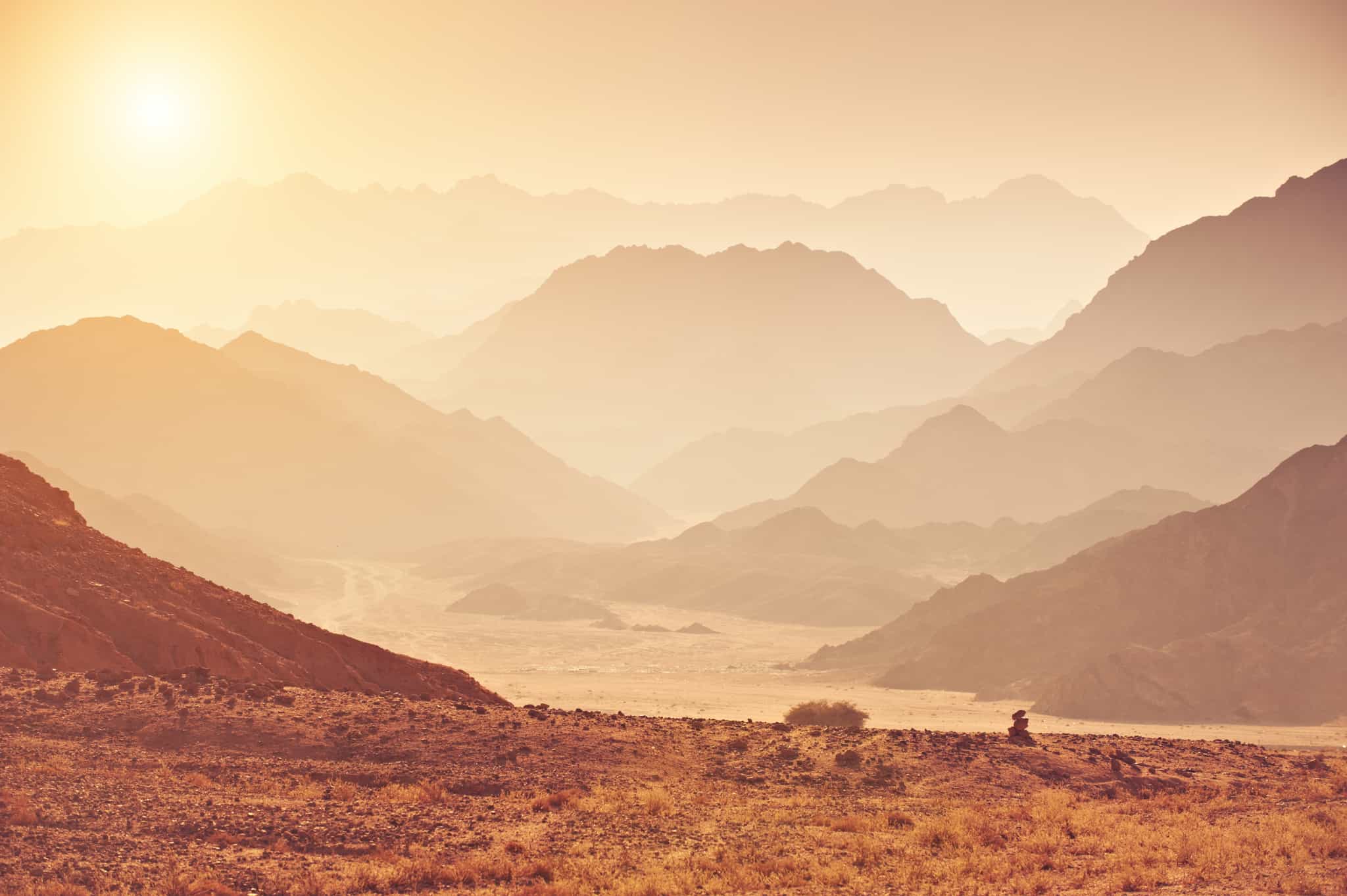
Hiking
If scrambling is your thing, today is your day! At 2587m, Um Shomer's jagged summit towers over a rugged wilderness of peaks, wadis and ravines. Until the 19th century, it was believed to be Sinai's highest mountain and as such, it became a prestigious goal for lots of European mountaineers (today, it is officially recognised to be the second-highest peak in Egypt, after Jebel Katherina). Start hiking early with a steep and challenging scramble, using your hands for balance. At the top, you'll be rewarded with epic views over the Gulf of Suez to mainland Egypt, as well as across the Red Sea continental divide. Descend back to camp and tuck into a delicious meal before curling up in your sleeping bag, gazing up at the Milky Way above.
Day 5
Telah Braika gorge and the Rahaba plain
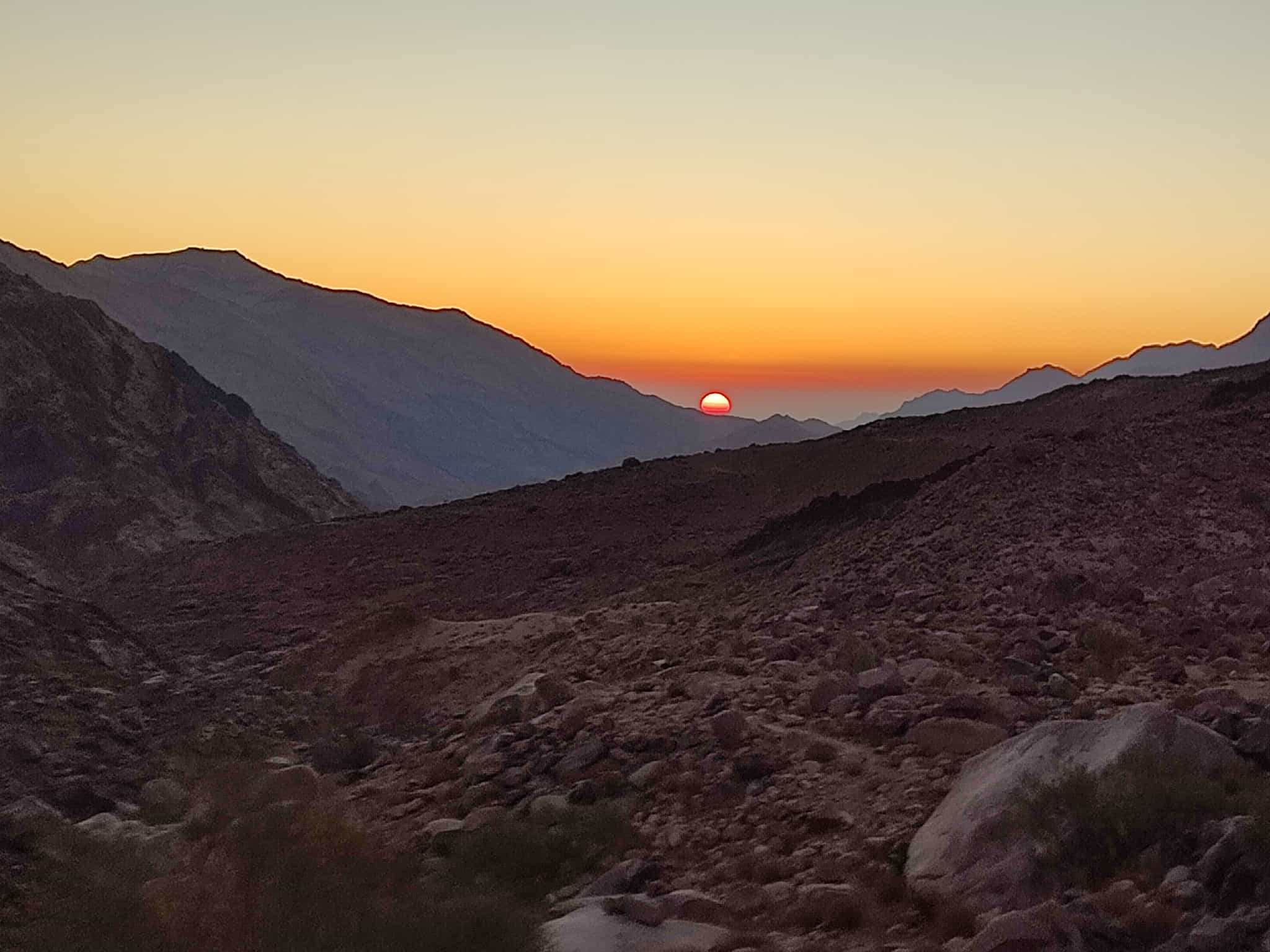
Hiking
Rise early and catch the spectacular sunrise from Crum Nassir while sipping on coffee. After breakfast, begin with a gradual ascent that criss-crosses the long Telah Braika gorge. Up and down, through sun and shade, over sand and rock - this beautiful hike is the perfect tonic after yesterday’s challenging climb. Enjoy a break in an olive tree garden planted by monks before hiking along the Rahaba plain - halfway between plateau and valley, it is lined by shallow peaks on each side. After days of complete isolation and remoteness, you may bump into a few locals along the way, before turning into El Waara, where you'll be welcomed to the guests' quarters in the home of a local family. Warm up with a crackling fire and some authentic Bedouin hospitality.
Day 6
Naqb El Ahemar: the Red Passage
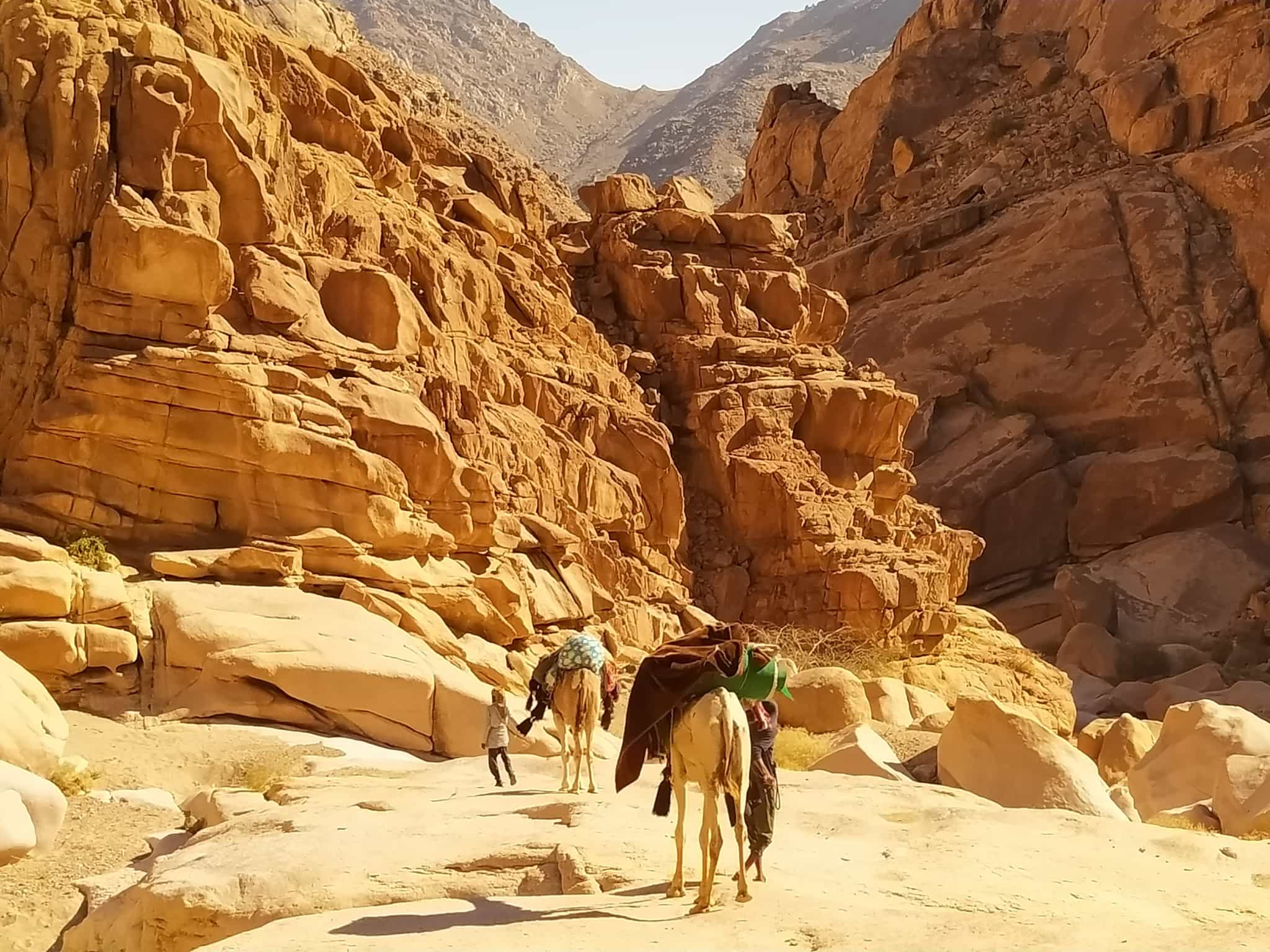
Hiking
Today, your life as an honourary Bedouin is filled with immense variety and wonder. After a breakfast of farashay - local Bedouin bread - enjoy a later start, giving the sun time to warm the landscape after a cool night. Follow remote walking trails, heading southeast through the valleys and peaks that eventually feed into Wadi Kidd. Traverse the astonishing switchbacks of Naqb El Ahemar (the Red Passage) which enable the camels to bypass massive boulders which block the middle of the wadi. Rain can alter the trail here, so the exact route may vary between the distances described. Marvel at the way the camels and their guides tackle this vast and challenging landscape, before setting camp on the soft sand of Ahssy Marziga.
Day 7
Ein Kidd Oasis
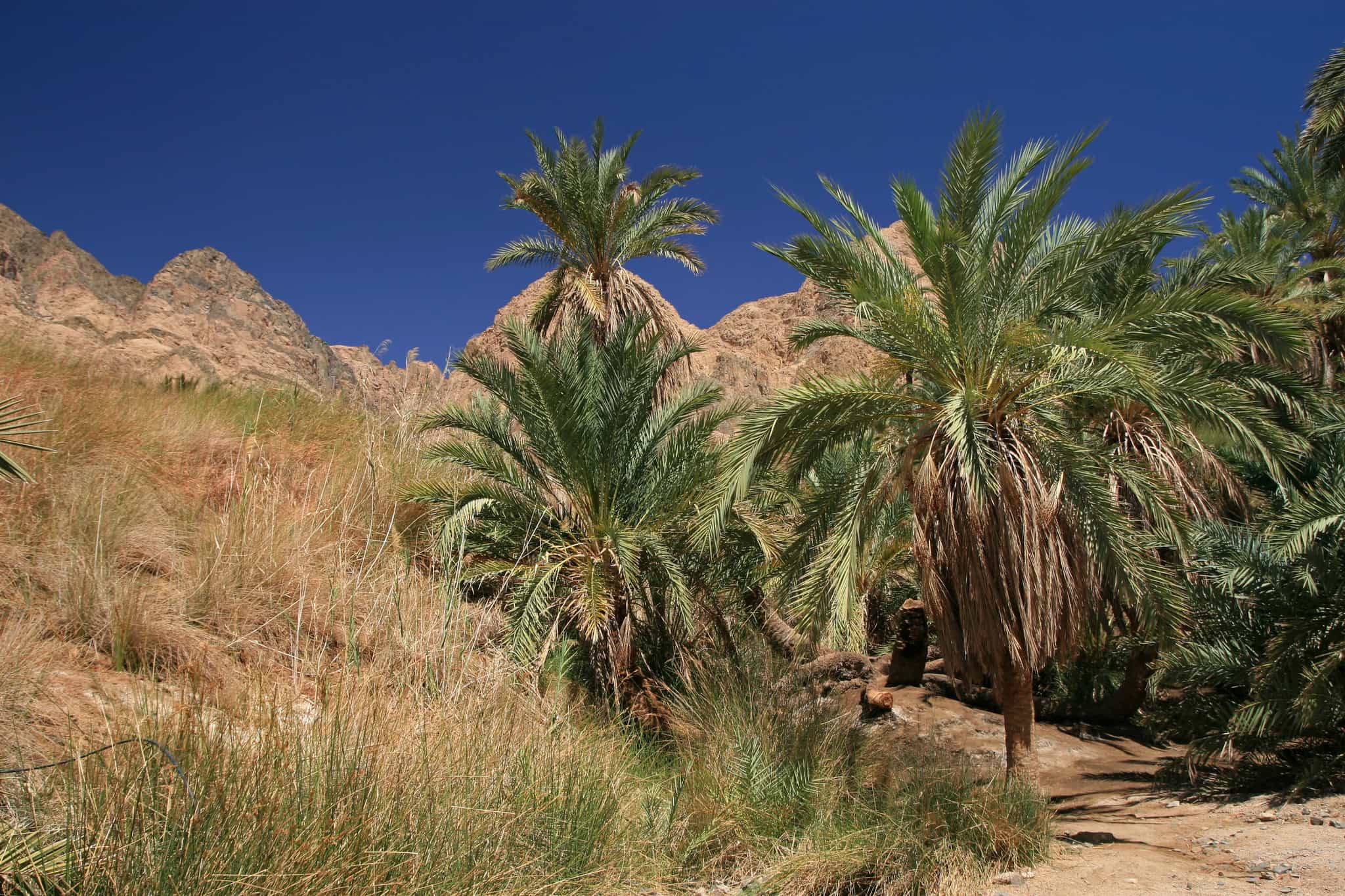
Hiking
Many of the old Bedouin routes through the Sinai move from oasis to oasis, seeking shade and fresh water. Your final and gentle hike follows the nomads' trails as you head south towards the sea. Then magically, after five days surrounded only by the remote Sinai wilderness and arid desertscape, walk into Ein Kidd. Hidden from view until the very last corner, you'll be amazed by the sight of a lush palm tree oasis. Take time to explore it while your guides prepare a final open air-lunch, before saying your goodbyes to the Bedouin team and meet the vehicles for a drive to Sharm El Sheik. Celebrate the end of this memorable desert adventure with your fellow travellers, and take time to slowly readjust to city life and the comfort of a hot shower and comfy bed.
Day 8
Sun, sea and coral reefs
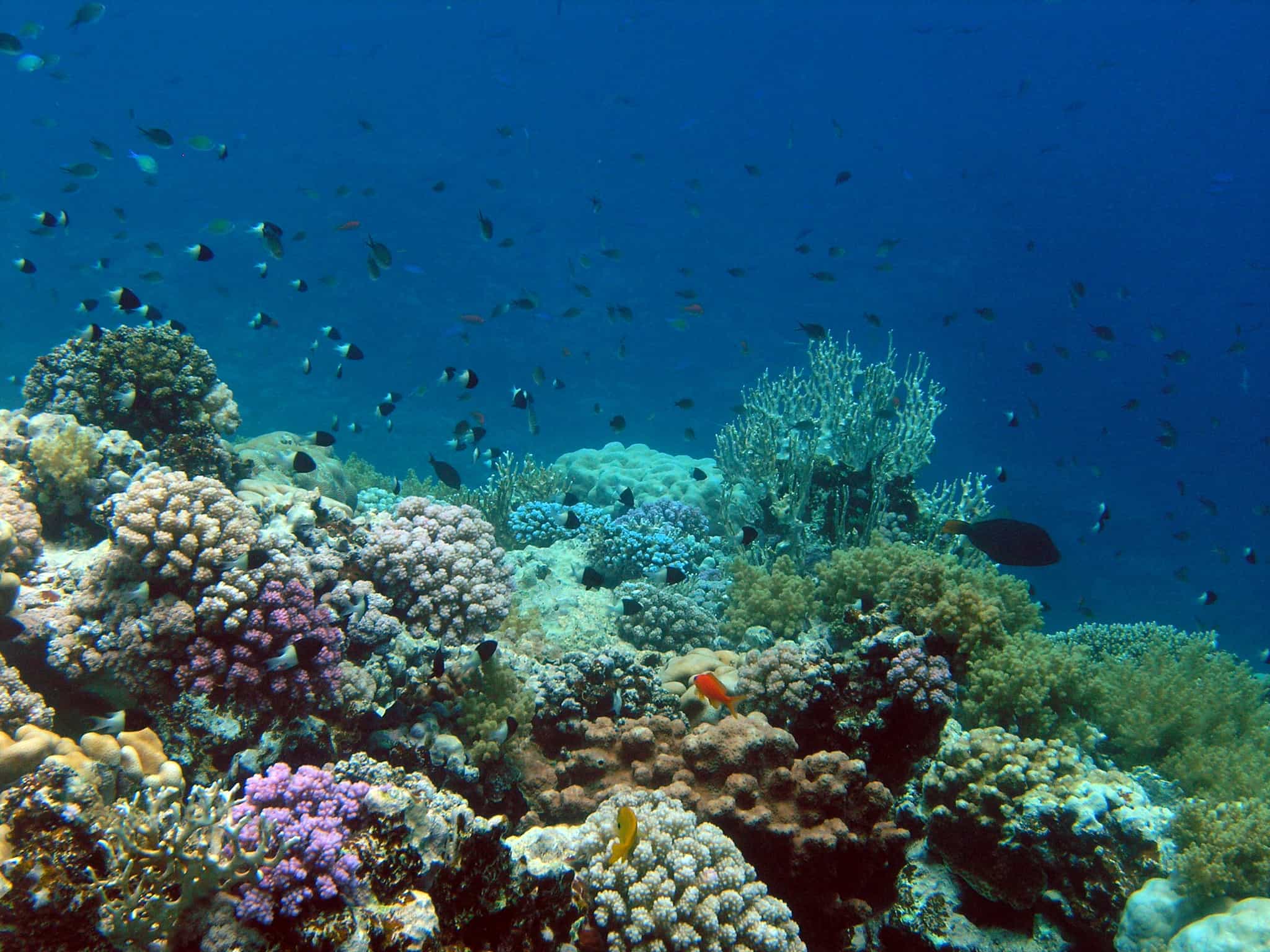
After six days in the remote Sinai desert, today is all about chilling and soaking up the sun on the hotel's tranquil private beach. You can also head out to the reef for some snorkelling or soothe your muscles with a massage. Travel back to Sharm El Sheikh Airport late afternoon for goodbyes and flights home (or, you may wish to extend your stay here or in Dahab, an adventure mecca known for its diving, rock climbing and other activities).
The Area
Logistics
Starts
Sharm El Sheikh International Airport
Arrive any time
Ends
Sharm El Sheikh International Airport
Depart any time
Transfers
Private airport transfers are included for any time (and day) you choose to arrive or depart. Please provide your flight information upon booking so that your host can book these services prior to the trip.
Travel options
There are direct flights to Sharm El Sheik International airport from major airports across the UK (usually scheduled weekly, Friday to Sunday) as well as from Europe.
Day 1
Breakfast
Lunch
Dinner
Day 2 – Day 4
Breakfast
Lunch
Dinner
Day 5
Breakfast
Lunch
Dinner
Day 6
Breakfast
Lunch
Dinner
Day 7
Breakfast
Lunch
Dinner
Day 8
Breakfast
Lunch
Dinner
What is the food like?
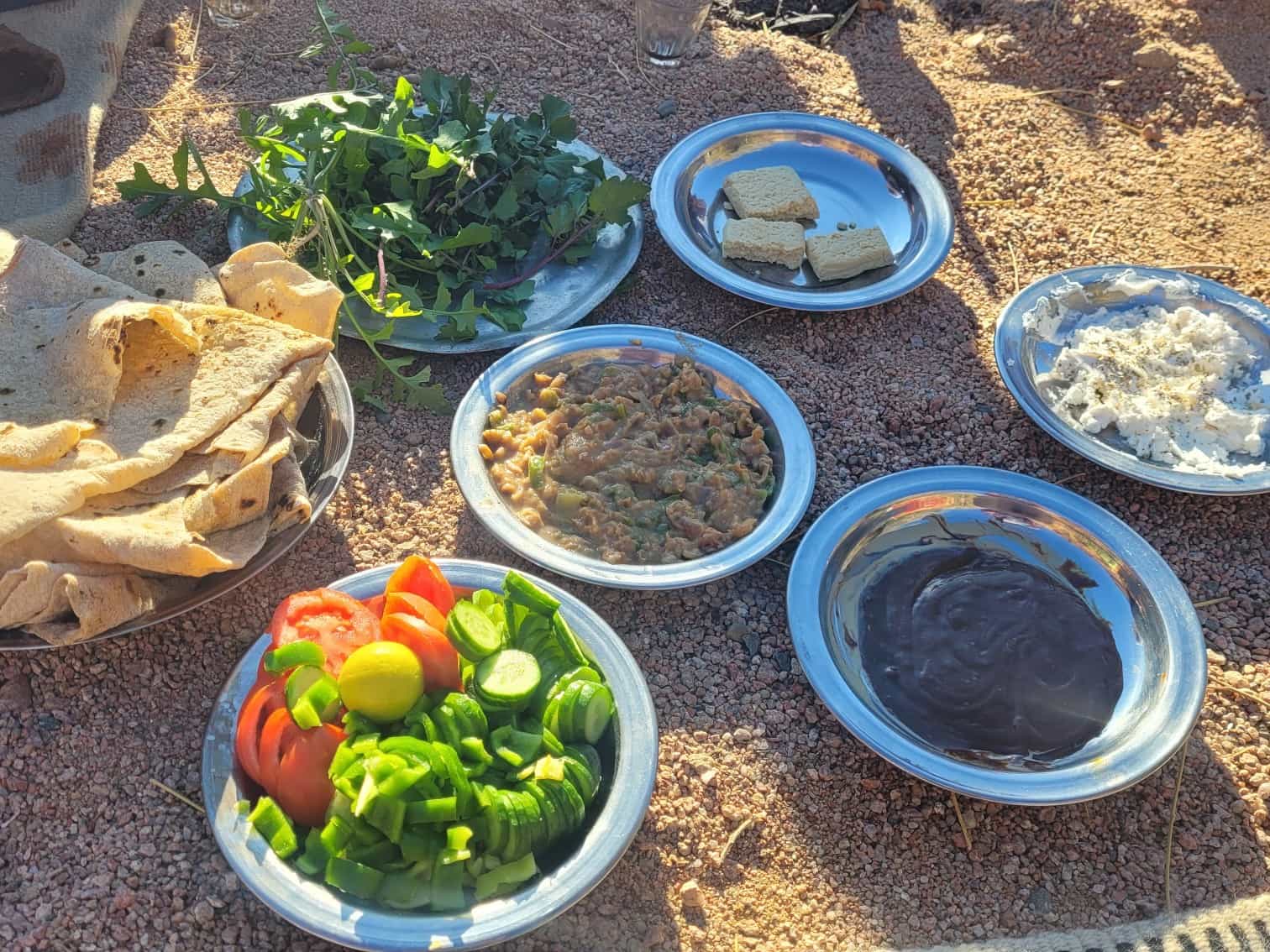
Traditional Egyptian meals are usually mezze-style, with several kinds of hot and cold dishes made with beans, eggs, cheese, salads or vegetable dishes and bread. During the desert expedition, your Bedouin guides will prepare all meals on fire and you are invited to help out - this is a great opportunity to learn some of their traditional desert wilderness skills. Breakfast will include jams, pitta bread, cheese, teas and coffees etc, while main meals are fragrant veggie stews, eaten with rice, pasta or mopped up with Bedouin bread - all hearty, healthy food freshly cooked on the fire, to fuel you up for the daily hikes. Bedouin tea and coffee are also included throughout your time in the desert.
Vegetarian and vegan meals are possible, but a gluten-free diet will be more difficult to accommodate due to the importance of bread in Bedouin cuisine, so please some bring some extra snacks with you. Please make any specific requests on your passenger info form.
What is the accommodation like?
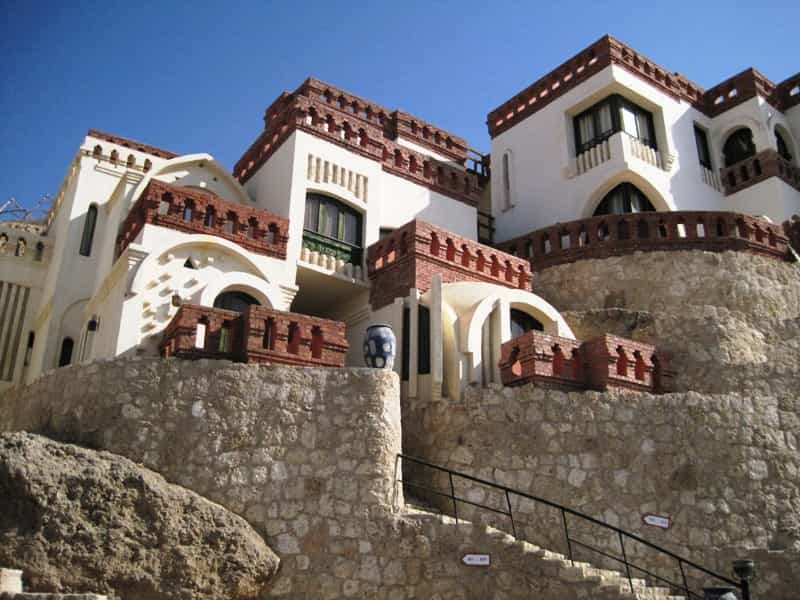
Sharm El Sheikh
Your first and final nights will be spent at the comfortable Sharks Bay Umbi on the shores of the Red Sea. The peaceful hotel offers traditional Bedouin style and warm hospitality - a sanctuary away from the big resorts. Rooms come with private bathrooms, air-conditioning and a TV. The hotel also has a great seafood restaurant veranda right by the beach.
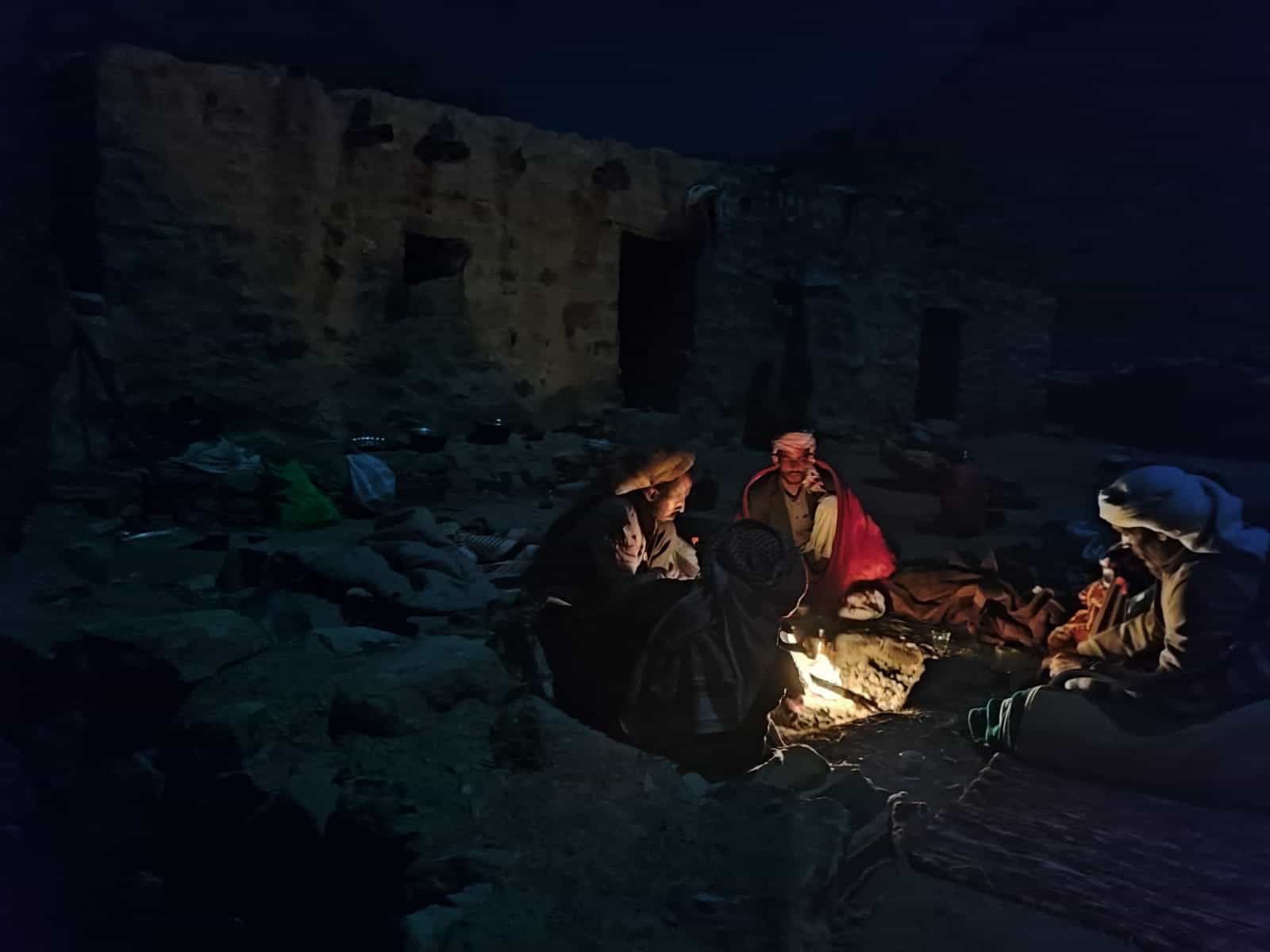
Sinai Desert
For four nights during the desert expedition, you will be sleeping out under the stars exactly as Bedouins do, for an incredible and unforgettable wild camping experience. Don't expect a standard campsite with toilets and tents: you'll be sleeping in complete wilderness, tucked into your sleeping bag or under warm blankets. Your guide will give you a full briefing on the etiquette and practicalities of outdoor toileting. For more information on this, please see our FAQs below.
On Day 5, you will be hosted by a local Bedouin family in the guests' quarters of an old stone building. Although basic, this is a more comfortable setting to face the cold desert night in El Waara and provides an opportunity to recharge your camera and batteries.
Upgrades
For solo travellers looking for their own space, an optional private room can be booked during the first and final nights, for an extra charge. See Optional Extras for the price. Please request this at the time of booking, as this is subject to availability.
This trip has been rated as Challenging
Overall, this is a moderate to challenging trek - although most of the hikes are not demanding, there may be some challenging elements, either due to the extreme weather conditions (hot during the day and cold at night), the remoteness of the desert and lack of facilities, or the long days.
No technical experience is required, but a good level of fitness and stamina is needed, and a bit of experience scrambling would come in handy. The day on which you summit Um Shomer is challenging as it includes scrambling and a significant elevation gain of over 900m. Trails on this hike are rocky, rough and steep, and although they are rarely exposed there is the occasional tricky section to tackle before you get to the top.
You should have a strong sense of adventure for this expedition, particularly as the wild camping in the desert will be a true wilderness experience with little comfort and very basic conditions (no toilets, electricity or tented camp).
What will I need to carry?
You'll need to have a larger soft duffle bag suitable for all your belongings which will be transported for you by camels and Jeeps, and a small daypack to carry personal items each day. Please don't pack more than you would want to carry yourself - 15kg is the limit for the kitbag and any extra weight (such as spare clothes) can be left with your host at the beginning of the adventure if needed. Bags with wheels/hard suitcases are not suitable for the camels. On Day 4, the camels won't climb to the summit of Um Shomer, so you will need to carry a little extra weight (water and food) on that hike.
This trip runs between October and April, when the daytime temperatures are lower and more pleasant for trekking (usually ranging from 18 to 30°C). Your guides will also schedule the hikes to avoid the hottest hours of the day, and will seek shade during lunch breaks. Nights can get very cold in the desert, with temperatures sometimes plummeting down to 0°C from the end of November through to the end of February. Cosy blankets are provided but a good sleeping bag is very important (3 or 4 season sleeping bag depending on the time of year - please see the kit list for more details). Be prepared to wear a beanie and warm thermals at night and this will be enough to make your experience safe and comfortable.


Sand, Sweat & Sweet Tea
If you're after a proper adventure (the kind that makes your legs ache in the best way, fills your head with new stories, and reminds you just how big and beautiful the world is) this trip delivers. From the very first day, Said and the amazing Bedouin crew had us in good hands, leading us through jaw-dropping landscapes that felt like something out of another planet.
Sure, the terrain had its moments, sand, rock, boulders, and some seriously steep climbs, but every tough stretch was broken up with perfectly timed sweet tea breaks and chill moments in the shade. Day 3's mountain climb? Tough, yes. Worth it? 1000%. Reaching the top felt like stepping into a postcard: only your group, a lone bird and a sense of deep, inner peace.
Evenings around the campfire were pure magic: delicious food, starry skies, music from the Bedouins, and the kind of conversations that only happen when there’s no phone signal and nowhere else to be.
What made it even better? This isn’t your average tourist trail. It felt wild, untouched, and incredibly special. The final push through epic valleys to a hidden Oasis was the cherry on top.
Massive thanks to Said, Tanis, and the whole crew. Friendly, professional, and clearly passionate about sharing their home. Can’t recommend it enough. If you’re even slightly tempted: JUST GO. You’ll come back dusty, tired, and absolutely buzzing.


An Enlightening Sinai Trek ✨️
If you're looking for an adventure that offers a physical challenge, a special insight into another culture and a deeper connection to the world around you, then this trip ticks all the boxes. Said & the Bedouin team led us through beautiful, dramatic landscapes. While the terrain was difficult at times, carefully timed sweet tea breaks & rest time made the trek manageable & extremely enjoyable. The mountain climb on day 3 is challenging but so rewarding. The evenings were spent around the camp fire eating, chatting & listening to the Bedouins play music. The desert sky is stunning & being disconnected from noisy modern life was priceless. Highly recommend.
Trek April-2025
Generally this is a really great tour, led by friendly and knowledgeable Bedouin Said and team. . . I would recommend it.
But keep in mind a few things. You will be walking in sand for long periods in the middle of the wadis which is tough and energy sapping. You will often get your evening meal quite late at night, hours after finishing the days walking. If you want to take pictures during the walking be quick as you will fine yourself running to catch up! This is a social tour with people quite often talking more than looking. No bathrooms just a scrap in the ground and wipes. That takes a little getting used to. Bring your own little cup.



Ten out of ten trek through the Sinai
Can’t say enough good things about Said, Tanis, and the entire Bedouin team — friendly, professional, everything you could hope for in leaders of a desert adventure.
Photos don’t do the expansiveness and atmosphere of the desert justice — you have to be there. This route is walked by few if any other tourists, which only adds to the adventure. This is certainly In the collection of the best treks I’ve ever done, highly recommend.
Wonderful experience, everything went to
Wonderful experience, everything went to plan and we were well looked after by Saeed and his team. Nothing was too much trouble for them. The desert was barren, the mountain was a wonder and the terrain was challenging at times, from sand to rock to boulder, we walked up and down, through long spectacular valleys to the Oasis at the end. The food was plentiful with frequent brews. A cup or three of sweet tea providing the energy for the next leg on the journey. Great trip led by a great man, thanks to the Bedouin team



Best Adventure Ever
I've now done a few Much Better Adventures and they are all great, but this was another level. Fantastic scenery & weather with wild camping thrown in. Immersed in the outdoors for 6 days with no signal was amazing. Said & his team were brilliant making sure we had everything we needed for an awesome trip. I can't recommend it enough. If you are used to walking in the hills or mountains then the terrain is fine with the only slightly technical bits on the mountain day. There's also plenty of rest stops most of which include tea! Don't miss out on this.





An enjoyable and important adventure
A truly amazing trip that is incredibly well organised. You will be well looked after and well informed the whole time in this excellently planned and paced itinerary. Not only this, the support for the local Bedouin communities is truly something we should strive to cherish and look after. 100% recommend you take this trip, you will come out the other side with a whole new perspective.


The most incredible Sinai Experience
Said, Tanis and their Bedouin team were absolutely incredible as we hiked our way across the Sinai. I can’t put into words just wow perfect this adventure was and I can’t recommend this enough! It was completely surreal and immersive and Said is so knowledgable about everything Sinai and Bedouin related! Loved every second and the group I traveled with were epic! Don’t hesitate! Get this booked! For more photos and insight feel free to check out my Instagram @sams_walkabout and i will also link in a YouTube video about the trip!


Splendid Sinai
I spent nearly a week hiking in Sinai. I stayed in Dahab afterwards. I had a safe and enjoyable time. I didn't meet any negativity. I was well looked after by Said and Tanis. I ate everything and had no issues. I didn't use the right tablets in my water once but within an hour Tanis had my stomach settled with some herbs. Follow the itinerary closely and have a 4 season sleeping bag. Pay for extra luggage. I needed nearly 20kg all in. I wished I had an extra roll of TP. And one more pack of wipes. Sharm is nice but Dahab is better. Tanis is so helpful. I really enjoyed my Sinai experience.


Finding a family in the desert
I cannot describe how perfect this trip was. We slept under stars, gathered firewood and mopped up delicious bowls of Bedouin food with freshly made bread. It was such a privilege to be able to move through the desert with Said, Tanis and their team. We were treated as family and came to think of them as family too. Going into the desert (where there is no signal or wifi, or even any reason to want either) meant we structured our time around nature’s clock. I will miss the routine of arriving at camp, layering up, unpacking a little then snuggling by the fire for hours. Thank you for the most restorative trip!




Great immersive experience
Well organised by Said and Tanis and the bedouins who were very helpful. Great views and walks. You feel very immersed in the culture and lifestyle of the bedouins. Sleeping in the desert was a unique experience!







You need to go on this adventure!
This has been one of my favourite adventures ever. The trip has been spectacularly planned by Said and Tanis, each day is unique with stunning views and excellent food. Fresh bread three times a day is something I am really going to miss. Said is a gifted guide to talk through the history of the area and how the Bedouin live in the Sinai. Climbing Um Shomer was incredible and the view at the top was breath taking (fresh coffee and bread at top was also a brilliant surprise!). Ein Kidd oasis on the final day was the highlight of a great trip and felt like Eden. I cannot recommend this trip enough. But please do bring thermals and warm layers. It is very cold at night and you will be thankful for multiple hats and gloves to wear in your sleeping bag. I also brought walking poles which helped in the sand and rocky routes.
Awesome!
What a fantastic trip! The scenery was stunning, Said the leader was excellent in every way and the support team of bedouin super well organised and slick. Enjoyed every minute of the walks, the delicious bedouin tea breaks, tasty food and evenings around the fire. Fantastic way to see in the New Year!

New Year 2025
🤩 fair to say this was one of the best experiences, treks, hikes, new years eves I have ever had. What an absolute blast. Said and his trusty Crew and Camels , cooked amazing healthy meals, brought us to new heights and showed me places that only a few have been to with a teapot that was never empty. Thank you to the rest of the group for sharing the laughs and making new long lasting memories



Perfectly formed adventure through secret Sinai!
I had an unforgettable time in the Sinai desert: sleeping under the stars and waking up to the sunrise, eating delicious veggie-friendly food three times a day (plus tea breaks), chatting into the night making new friends around the campfire, accompanied by the music of our Bedouin guides and many games of UNO and the camel poo game (ask Said. . . ). We didn’t see a single other tourist for five days - this, combined with the digital detox that is the Egyptian wilderness, made for a simultaneously peaceful and energetic week amongst unexpectedly jaw-dropping scenery. The itinerary has been impeccably put together by Tanis and Said who, as well as being local experts, are incredibly welcoming, knowledgeable and professional hosts, going out of their way to make sure everyone feels looked after. I could write thousands more words to describe this experience, but they wouldn’t do it justice – just go and see for yourself!
Go on this trip!
This trip was a truly extraordinary and unforgettable experience. I didn't want it to end! Our guides, Tanis and Said, are such generous, humble, wonderful people who really care about your experience and welfare. There was a perfect balance of relaxation and active challenge - each day was special for different reasons. The food that our guides cooked for us was authentic and delicious, and I felt so well looked after. The service that MBA provide from start to finish made the trip seamless and so easy - MBA organised absolutely everything, so I could totally switch off and there was zero hassle. If you love stripping it back and being fully immersed in the outdoors, this is the trip for you and I would fully recommend it!





Best trip I’ve been on!
This truly was a unique, enriching experience, and not something I’d likely forget anytime soon. The landscape was incredible, harsh at times, but held intrigue around every corner. Our Bedouin guides were incredibly warm and generous, showing us their home and teaching us the ways of the Sinai desert. Said and Tanis taught us the significance of the indigenous plants, where they grow and how to use them.
The trekking itself was varied, climbing Um Shomer was at times challenging but at every step of the way we were in good hands. Looking back, this was some of the most enjoyable technical hiking I’ve done.
Once the evening sets in the desert can be frigid, but the provided blankets, radiant campfire and copious amounts of bedouin tea kept us in great spirits. Not to mention the poetry, music and dancing.
This is pretty much authentic as it gets, do not miss out and book!



Nomadic trek
The experience of sleeping under the stars in the Sinai Dessert was amazing even though very cold in the evenings.
Saeed and Tanis were excellent in leading the trek and explained everything to us that was important.
The climb to mt Shomer will be the highlight, this is a technical and challenging mountain but the views from the top are breathtaking.
Food and transportation was excellent.




A unique Bedouin experience
Quite a unique trekking experience through the Sinai Desert. Amazing scenery and landscapes throughout the whole trek and sleeping directly under the stars was incredible. Some of the nights were quite cold (waking up to a frost covered sleeping bag!) so prepare to pack appropriately this time of year. We had amazing nights sitting around the campfire listening to traditional Bedouin music and stories. The trekking itself is quite manageable with the only real challenging day being the scramble to summit Um Shomer but the views from the top were well worth it! Said and Tanis did a great job looking after us every day and planned a great itinerary. Would recommend this trip!







Amazing, unique adventure
The whole experience was insanely well run. We were fortunate to have both Tanis and Said on our trip and their passion for what they do is unmatched. They were clear in what we were doing each day and explained aspects of Bedouin culture to make us appreciate what we were doing and how special it is. The trekking isn’t too challenging and days aren’t too long other than Um Shomer where there is a lot of (very fun) scrambling but definitely worth it. Each day offers something different to enjoy so you’re never bored. The magic of sleeping under the stars is hard to beat but be prepared for very cold nights (we had frosty sleeping bags one night)! Overall an incredible experience and would recommend Desert Divers to anyone with a sense of adventure who wants to experience Sinai in a different way!
The Perfect Escape?
A fantastic trip across a unique, overlooked and stunning place. Everyday was well planned, a fantastic route, expectionally well organised and supported
The trip is not for the faint of heart, the days are hot and nights are freezing but you quickly bond as a team and as friends and every moment becomes magical
If you want
Best travel experience ever!
This was without a doubt the most brilliant travel experience I’ve had. The route was well planned, the guides were hospitable and accommodating and took us through the most beautiful parts of the Sinai.
Would highly recommend to anyone considering!
Albena Andonova
Hello, sorry for my late feedback but I am finally home and I would like to write some words for what I survived. I hope this mail reaches all levels in your company as it is not only to say thank you. Coming to Sinai I expected good guide and helpful team. Some good guys who take care for the undisciplined European people but what happened exceeded a lot my expectations. I have experience with this kind of adventures and I would like to share that Said and his team are way over guide and cockers and porters. This people work with their hearts and this is the reason we graduate the trek. It is not only to guide people. It is to feel their fears and to make them overcome. That is what Said do - he is a Magician, a Healer, he is Desert God. You are very lucky to have him on your side. Take care of him because he is more than a face of your company. People like him will make me choose your services again in the future and to recommend you to my friends. I wish all the best to all of the team and good luck to your company. For sure I will make some adventure with you again,
Best wishes, Albena Sinai, October 2024





Unforgettable Adventure!
This trek through the desert was such a wonderful and magical experience! I enjoyed the daily hikes, teas and coffees be the fire, interesting conversations with Bedouins and the lovely group of people who did this with me. The scenery was stunning everyday day and the views from the mountain we climbed were just breathtaking! I felt that Said and his team put their heart and soul to make this trip so enjoyable and they passionately shared information about their culture and Bedouin life. It was a pleasure to hike in wilderness and do wild camping with such a great company. This was my first trip with Much Better Adventures, and I am so impressed with what they offered; I will definitely be booking more trips next year!
The Nomadic Trek through the
The Nomadic Trek through the desert was a fantastic experience. The route chosen was balanced in terms of the stunning array of varying scenery and the terrain to cover. It was a challenging and enjoyable hike. The views from Um Shoma were incredible. The food was always very plentiful and welcome. Said and his team were informative and eager to pass on their enthusiasm for the Bedouin way of life. The experience was authentic, unspoiled and genuine. The trip was an opportunity to see and enjoy a wilderness with the people who know it best.
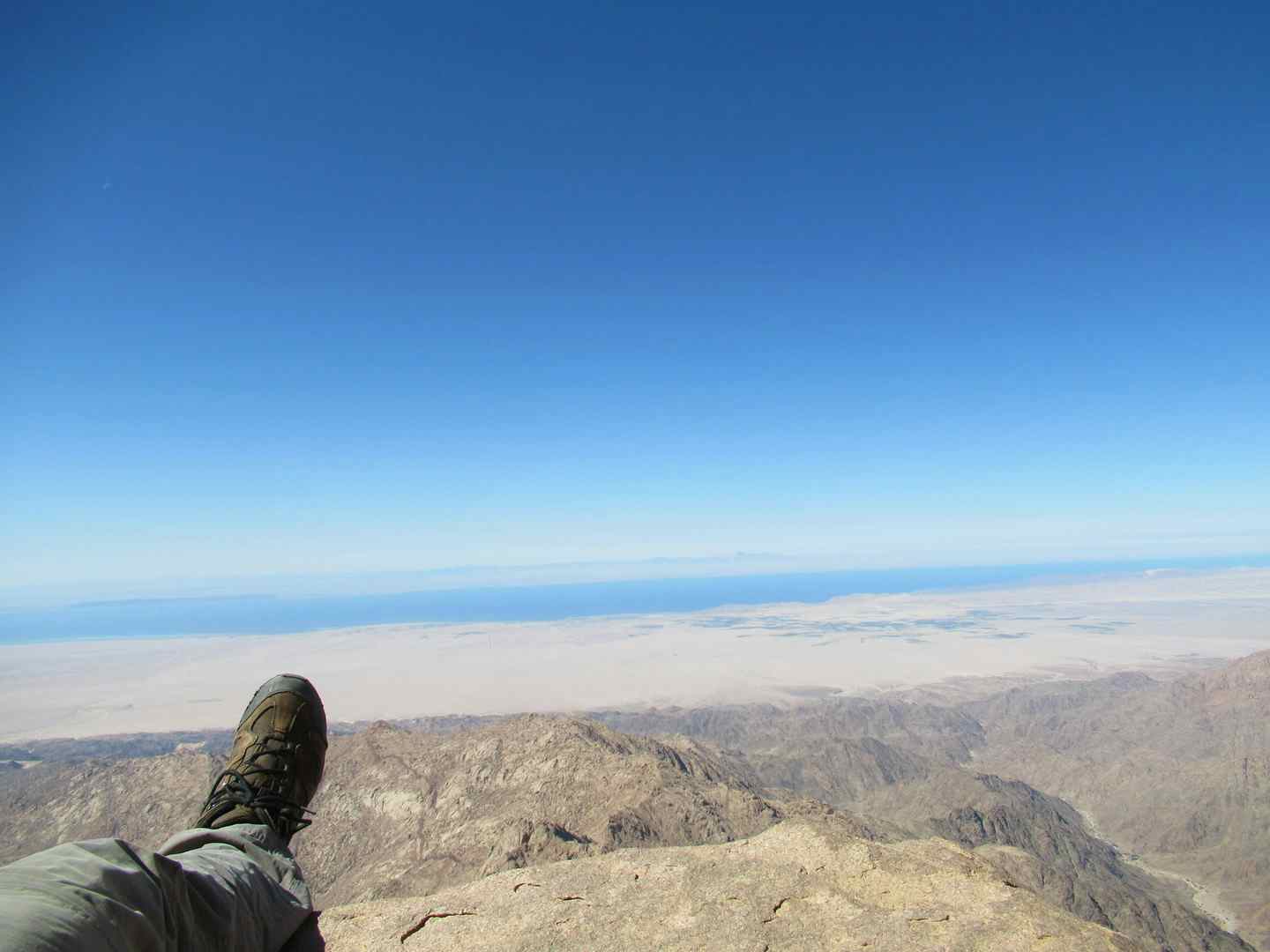
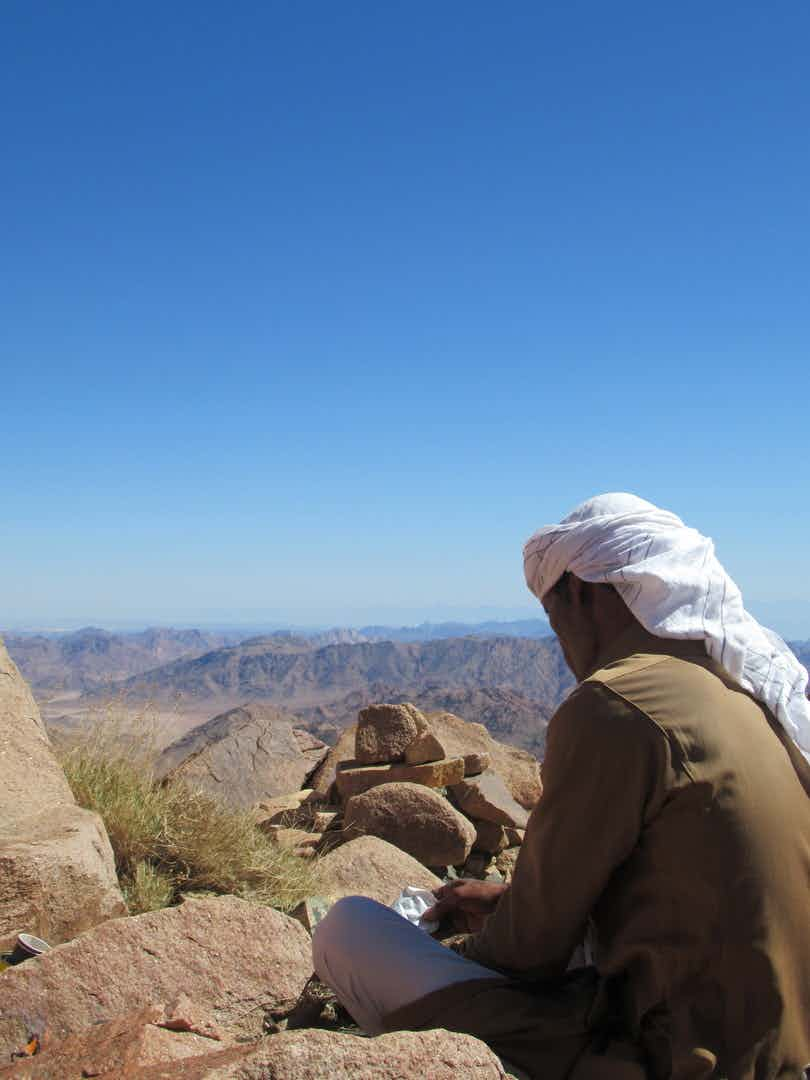
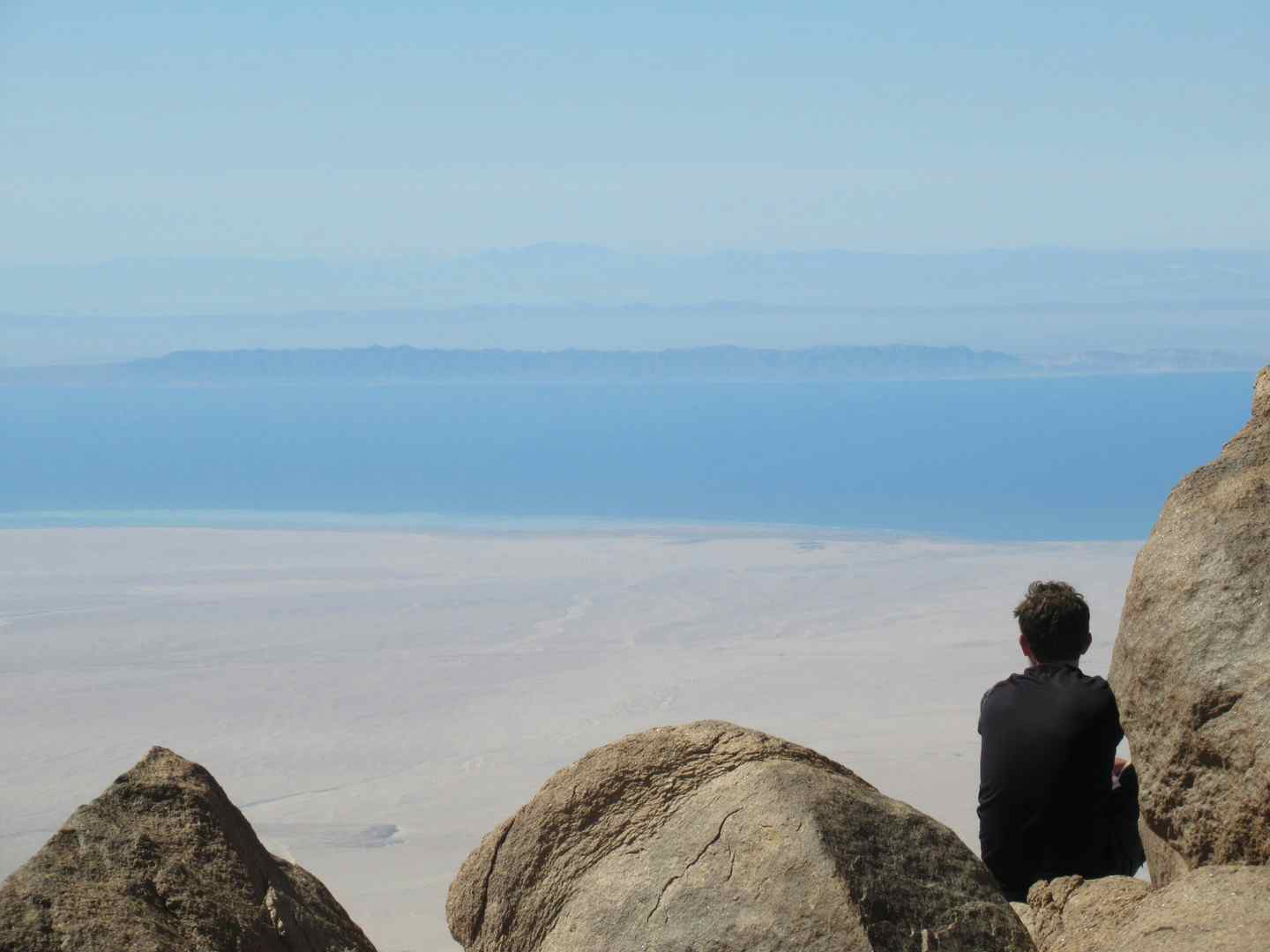
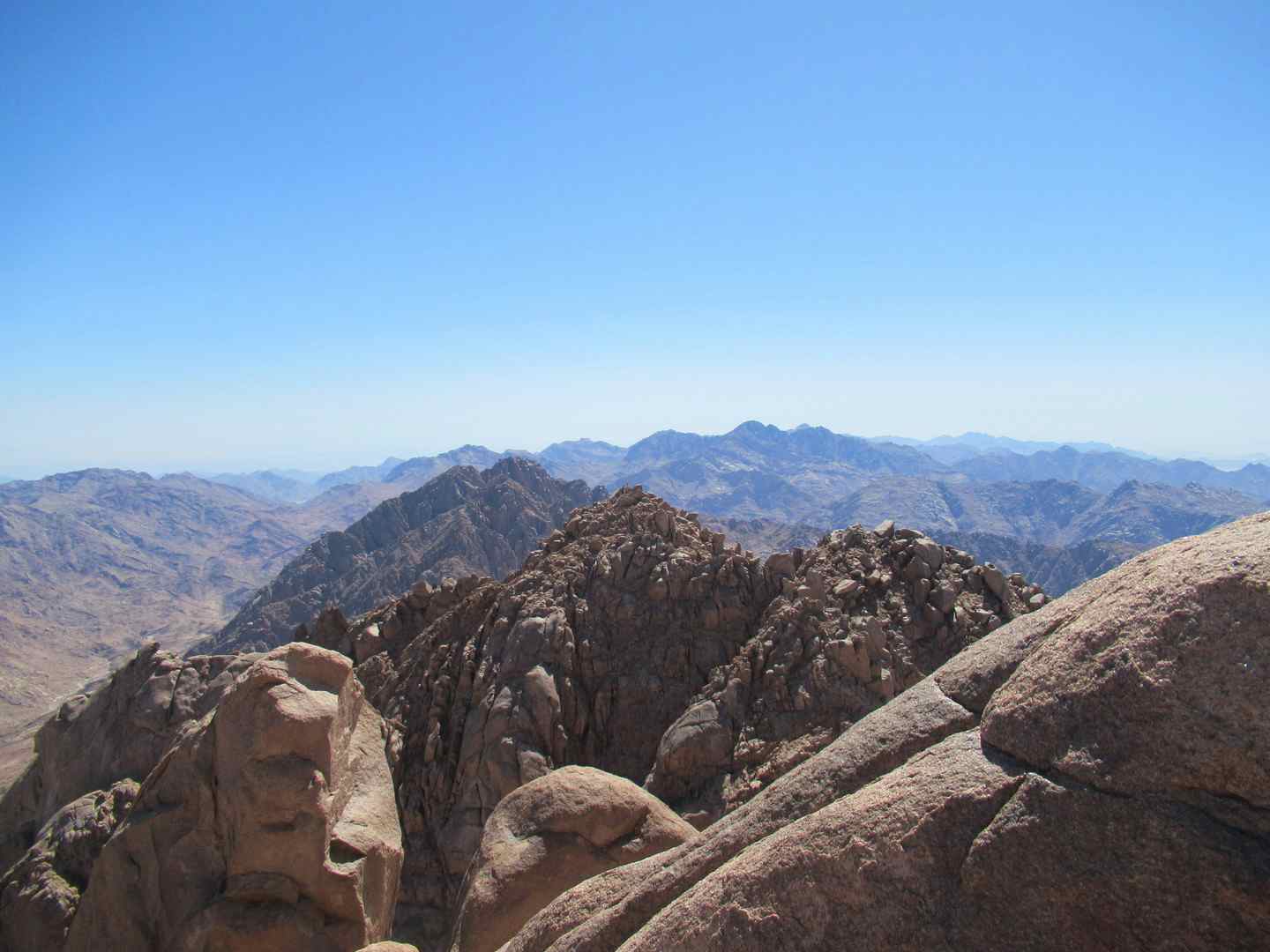
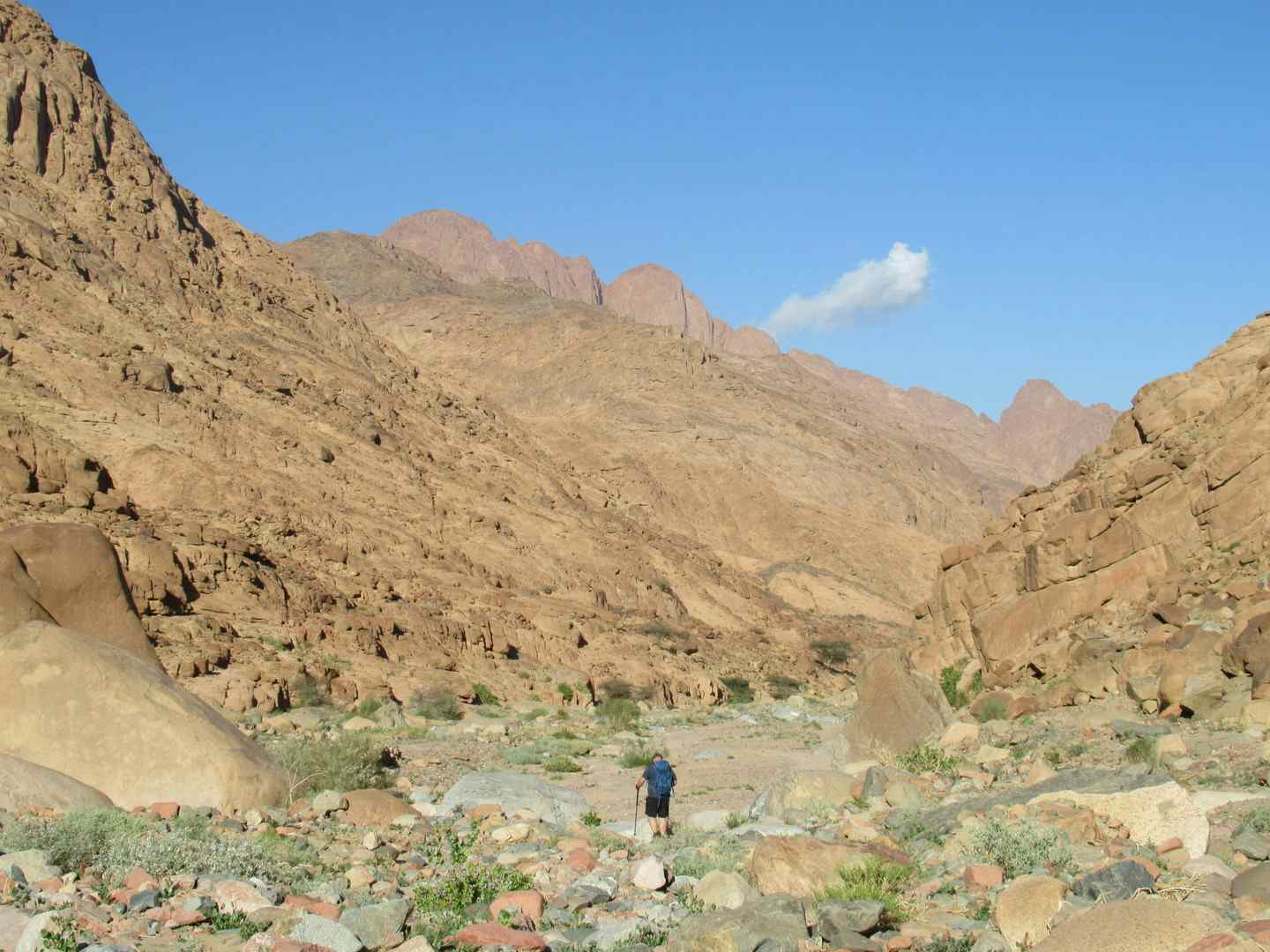
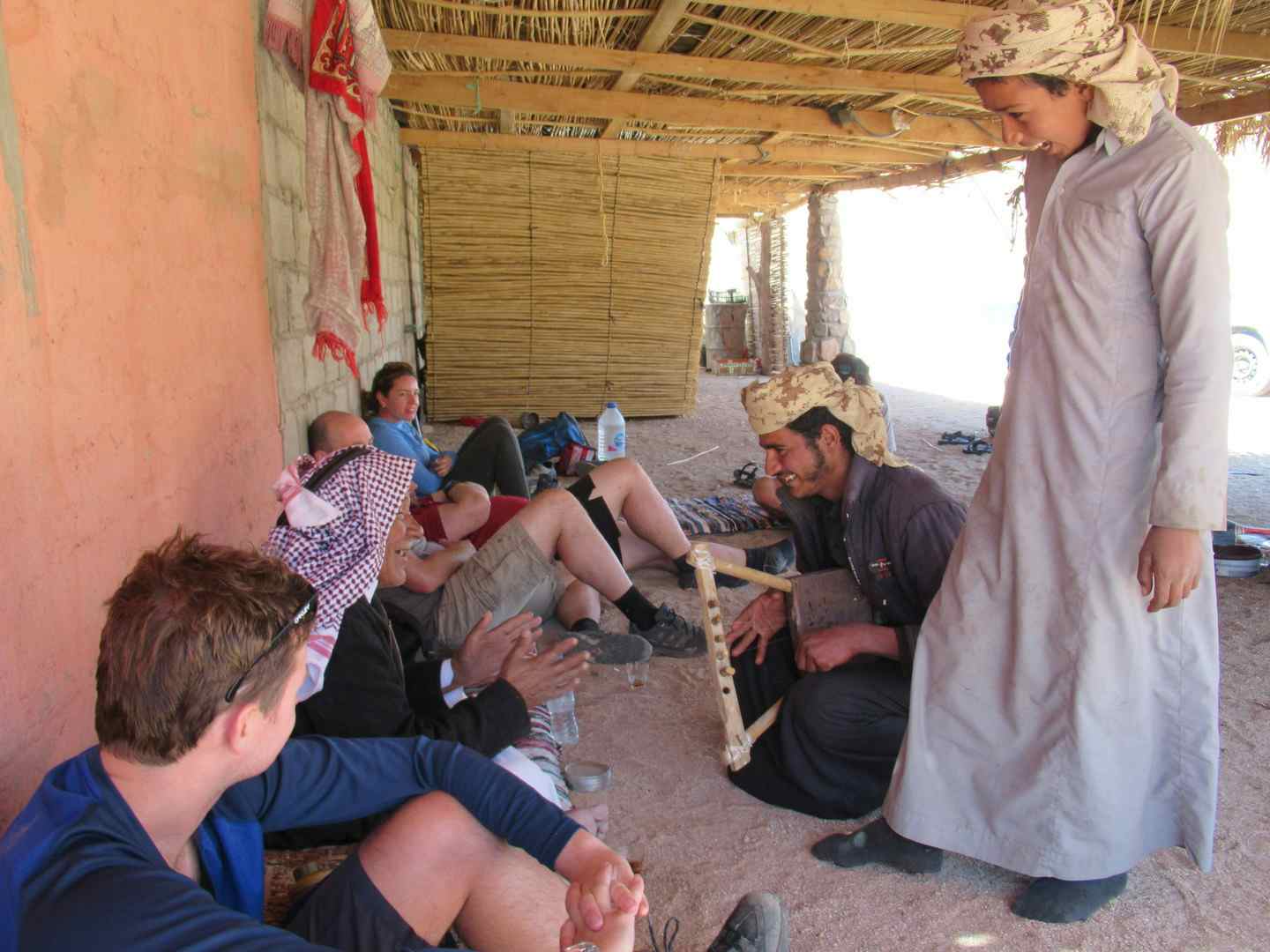
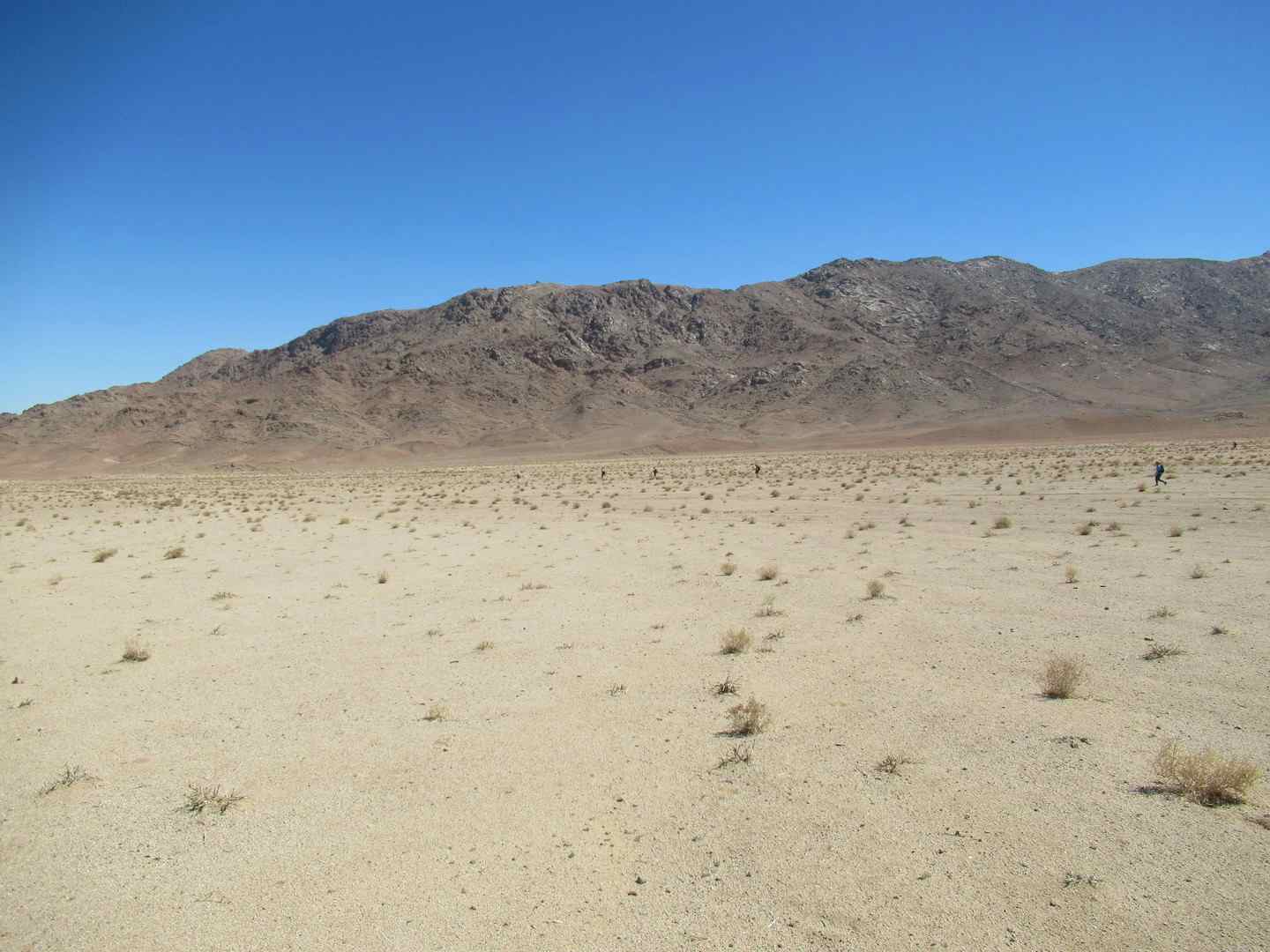
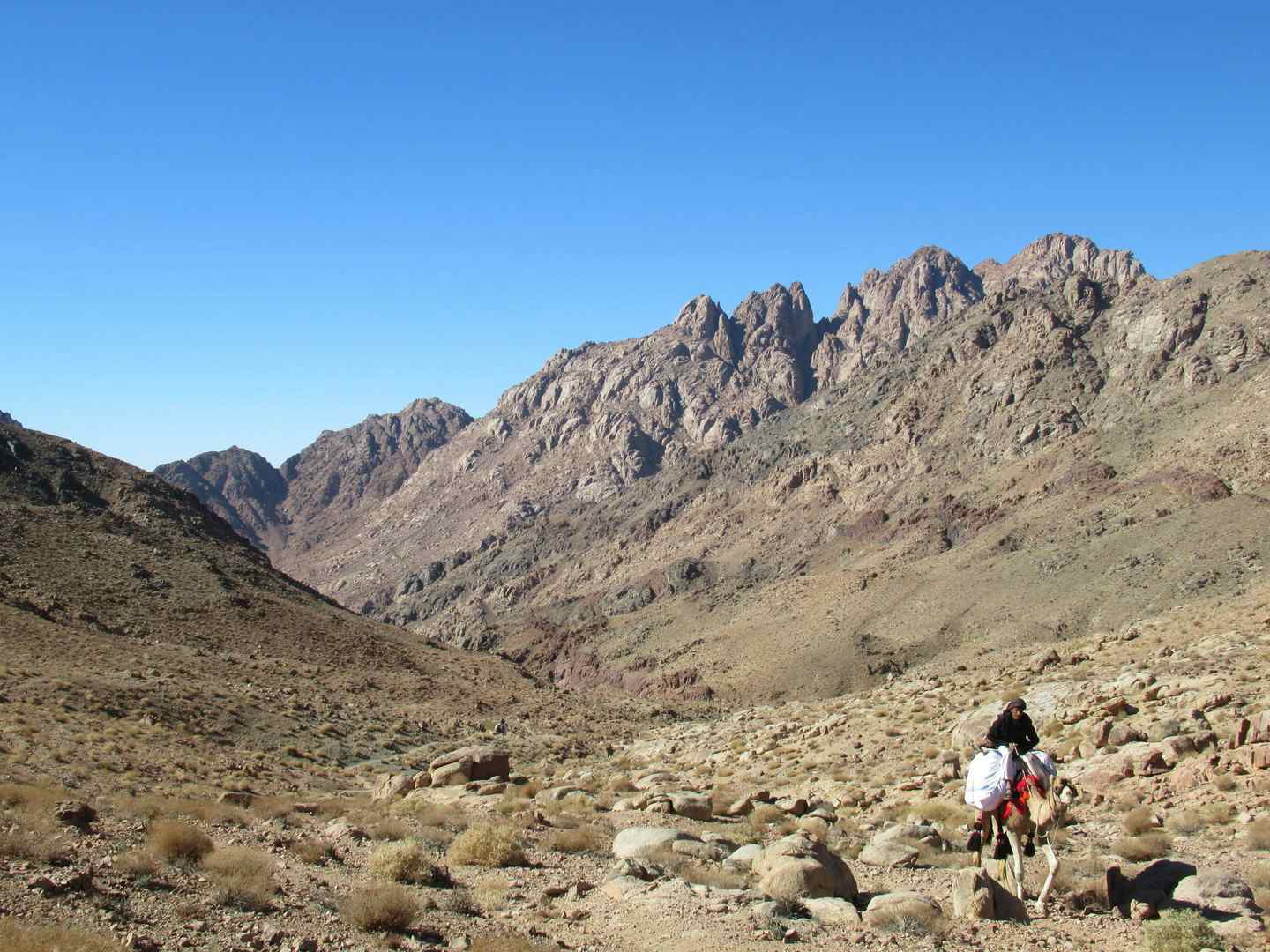
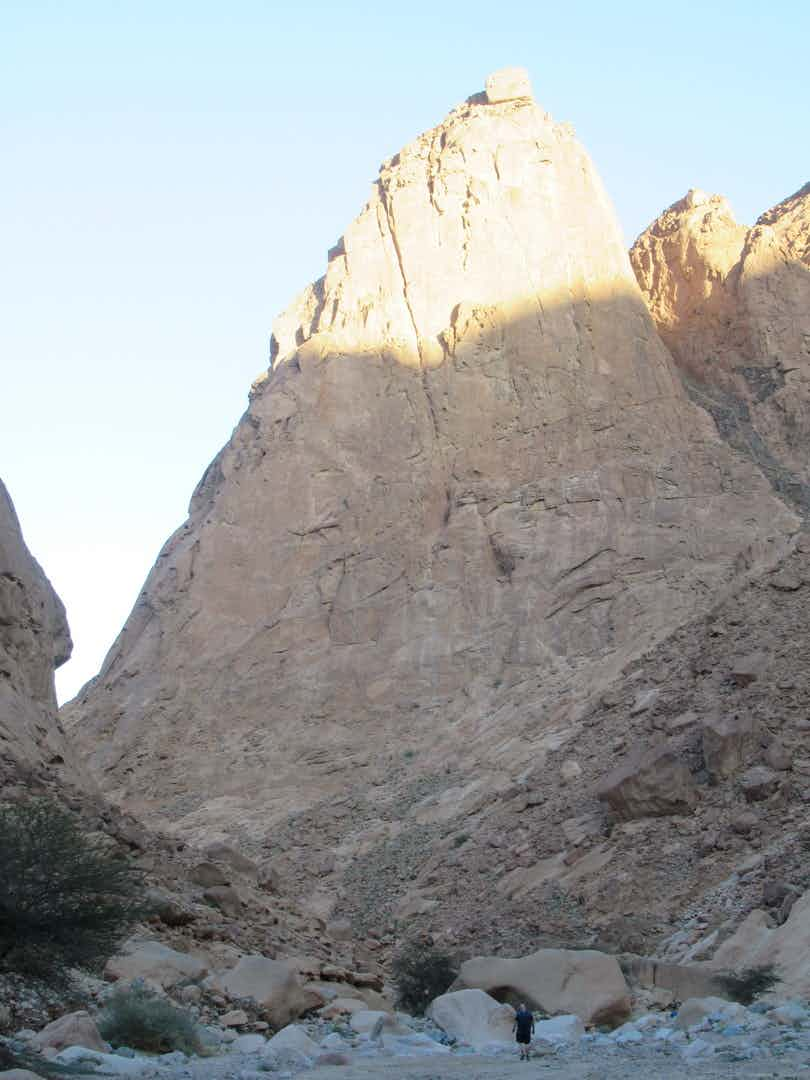
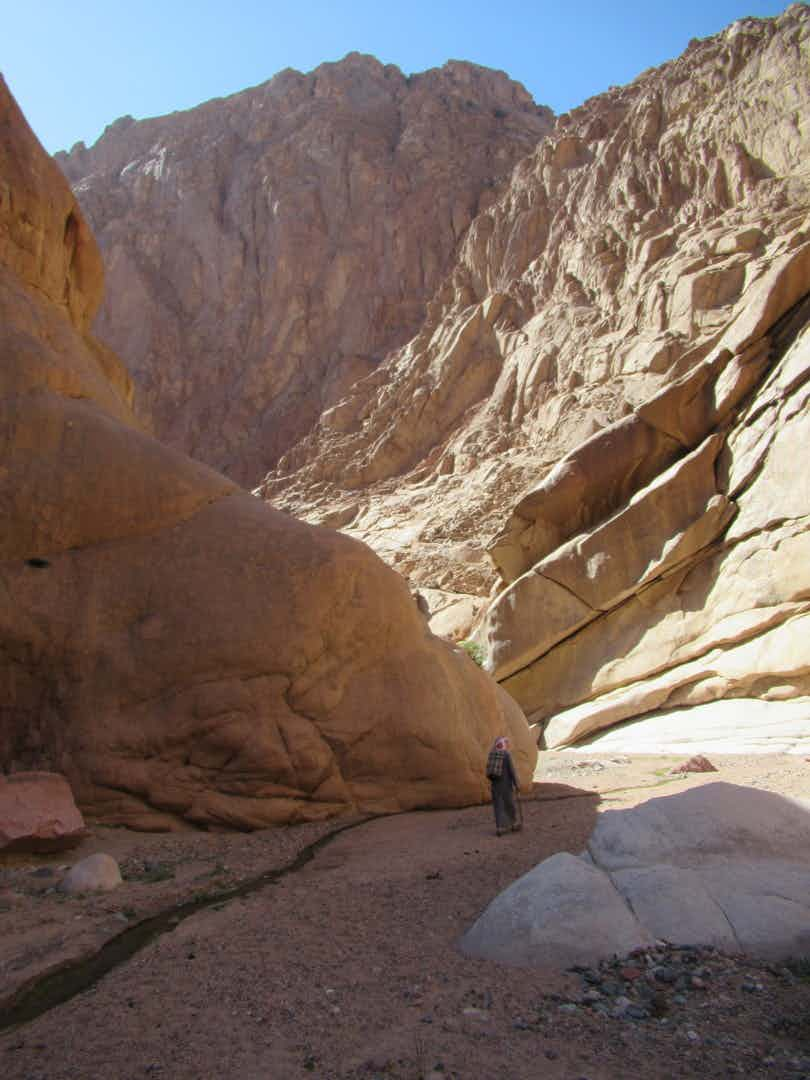
The ultimate escape
Special.
Unique trip to a beautiful and remote area
Superb trek through seldom visited parts of the Sinai desert, and a fun ascent scrambing up the granite of Jebel Um Shomer.
Said was a outstanding guide, with a passion and depth of knowledge of the area that's hard to find. The whole team worked hard to look after us. The itinerary was well designed to show varied areas of desert, and surprisingly diverse flora. We saw no-one except maybe a dozen locals for all the desert section of the trip.
The long evenings looking up at the stars by the fire in the absolute silence of the desert are pretty magical.
The trip is fairly strenuous and I suffered with blisters from day 4 so prepare better than me! Much of the trip is very remote, it may be difficult to get help if things go wrong. Also some people found the scramble up Um Shomer a bit daunting so it may be a good idea to do a few scrambles in the UK to get familiar.
The excellent snorkelling right off the beach at the hotel was also a bonus.
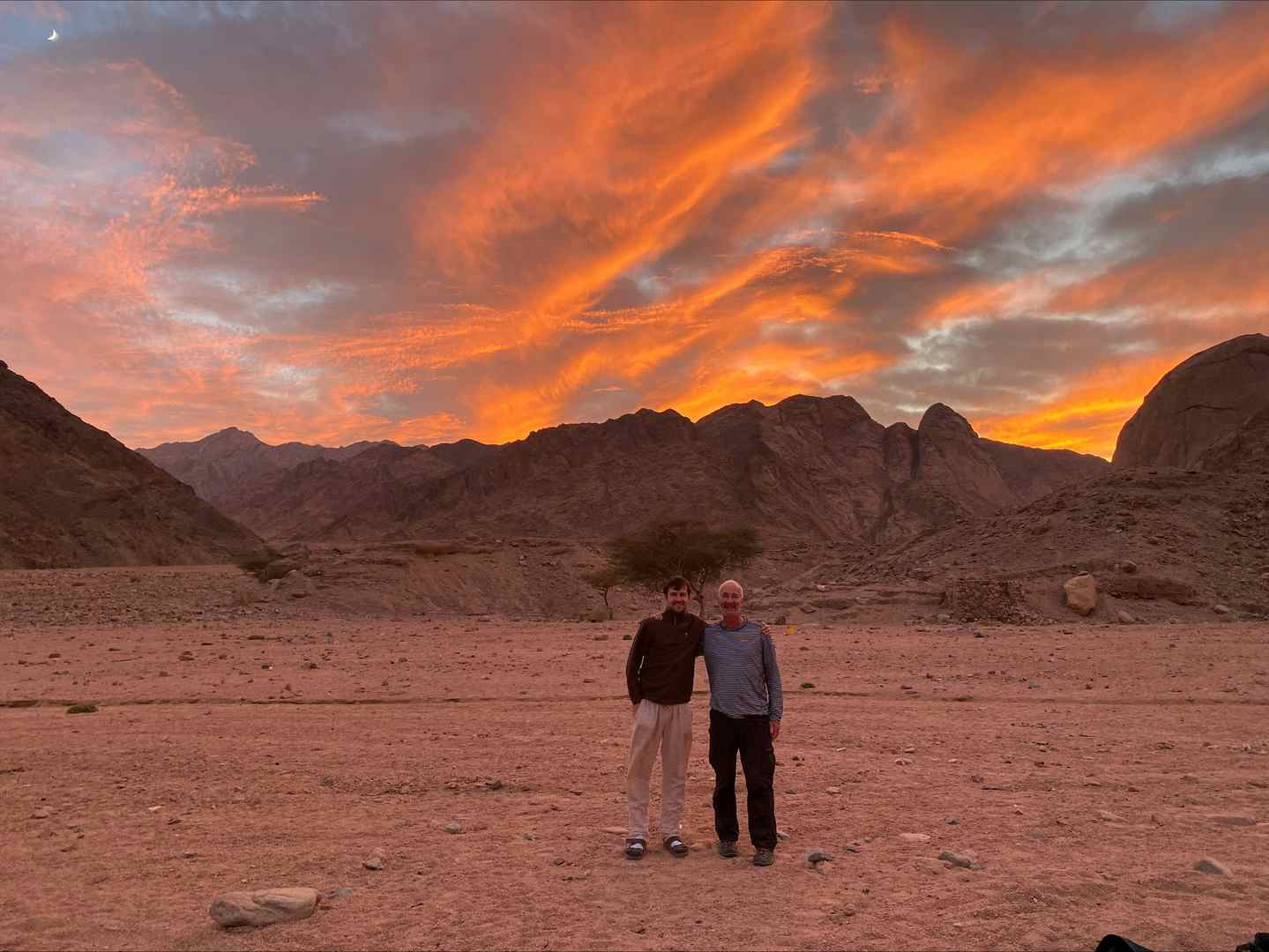
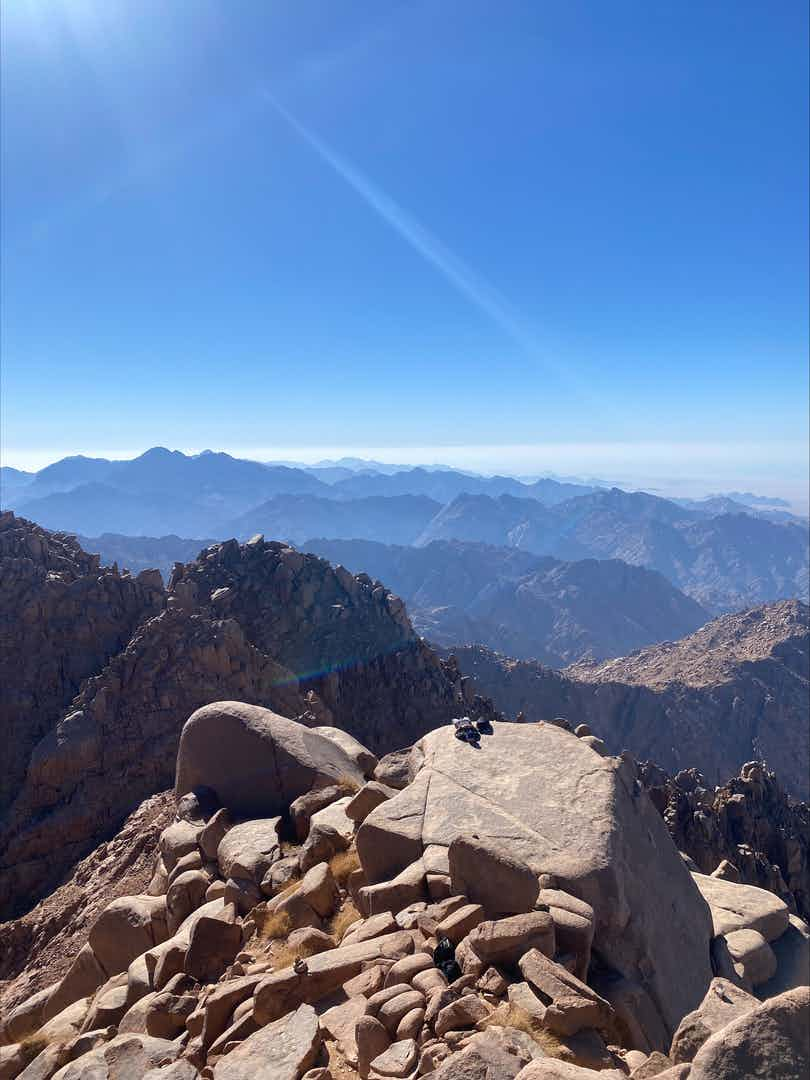
A Father and son trip
This was a father and son trip for us. We loved the austere beauty of the South Sinai- mountains, gorges and wadis. The walking was significant, but not overly taxing, with breaks on the way. Evenings by the fire, under the stars, were magical. Make sure you bring warm clothes and a decent sleeping bag and mat for the nights. It was a treat to experience such an extraordinary environment and a privilege to be lead through it by Said and his team. They were fantastic at all times.
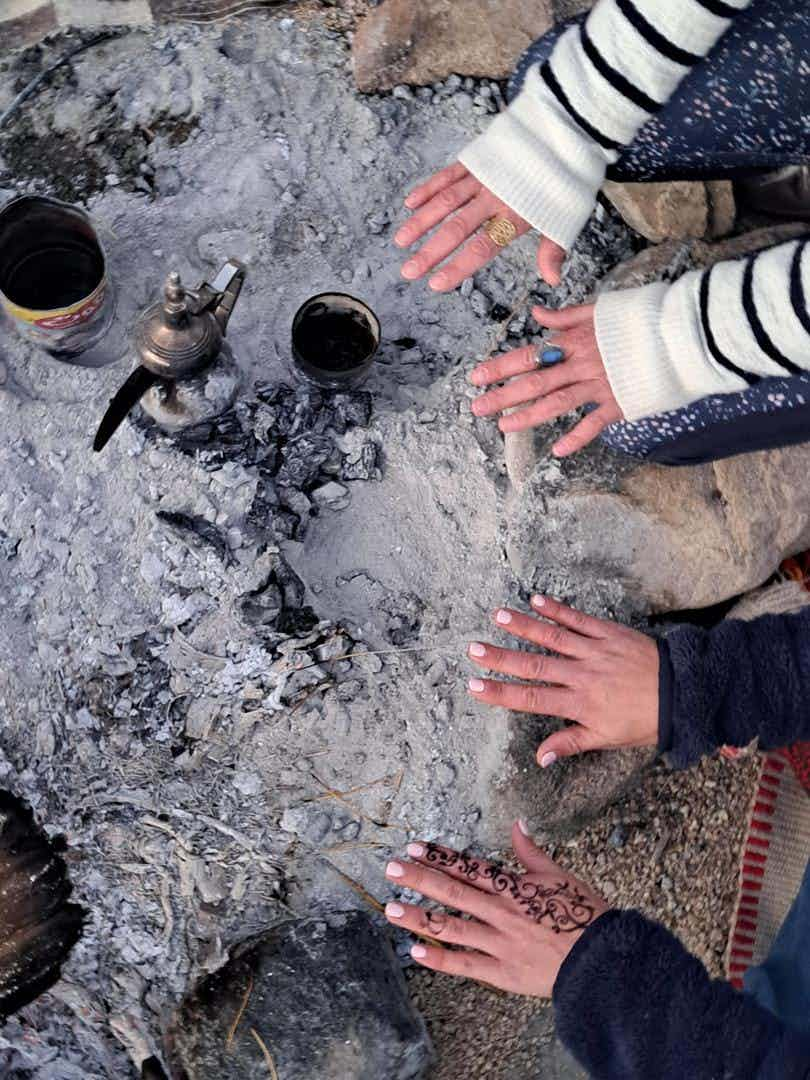
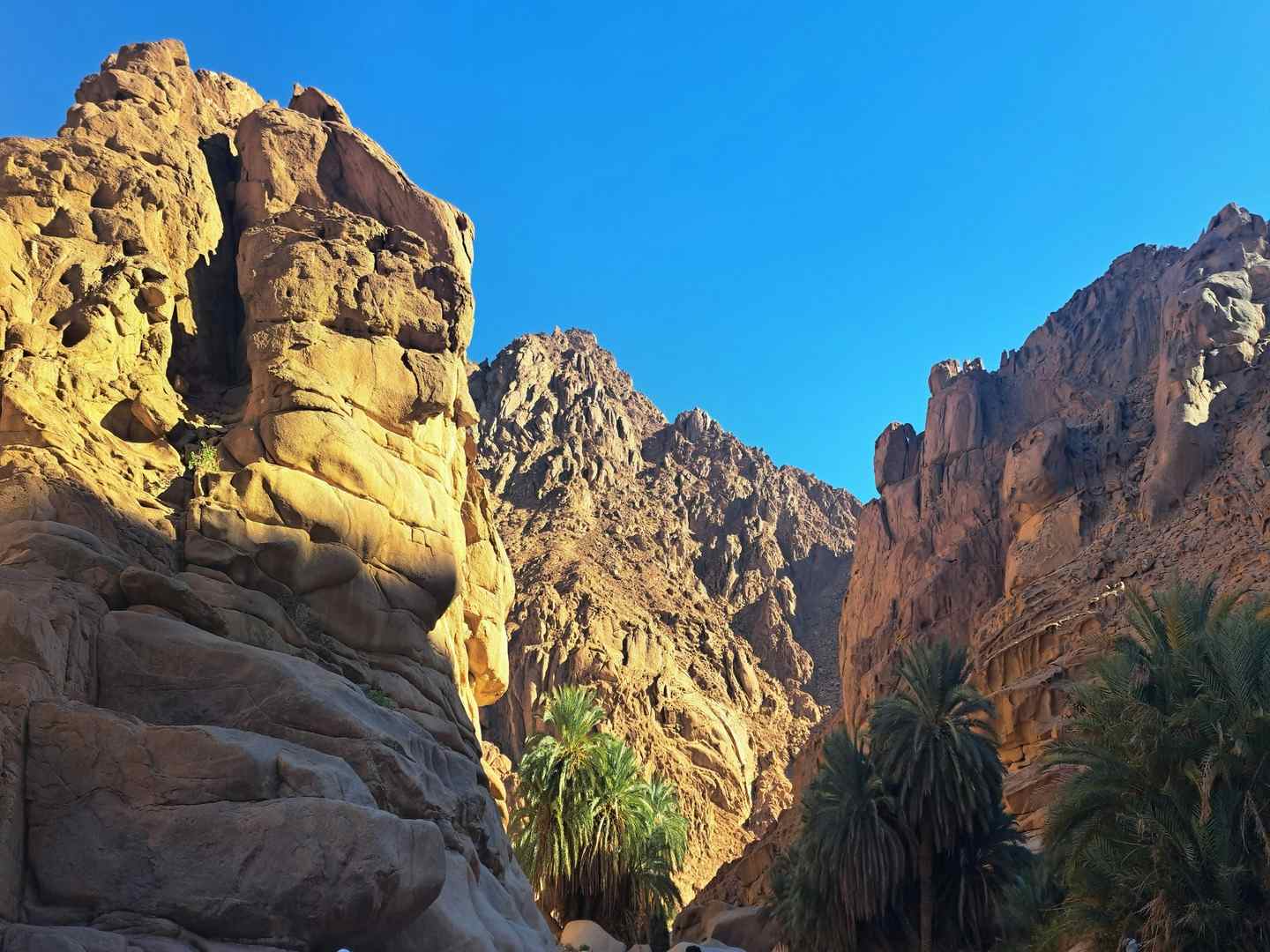
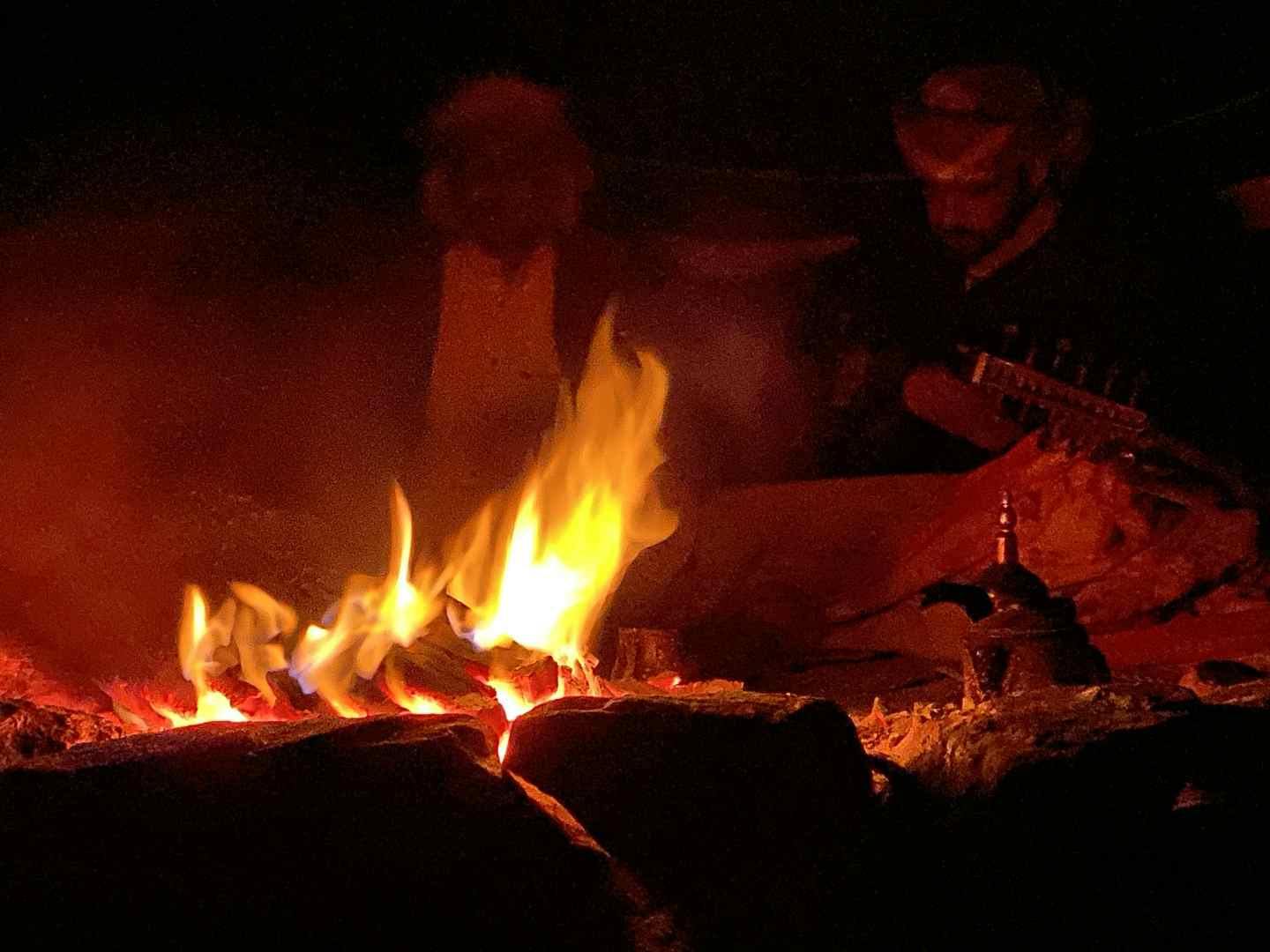
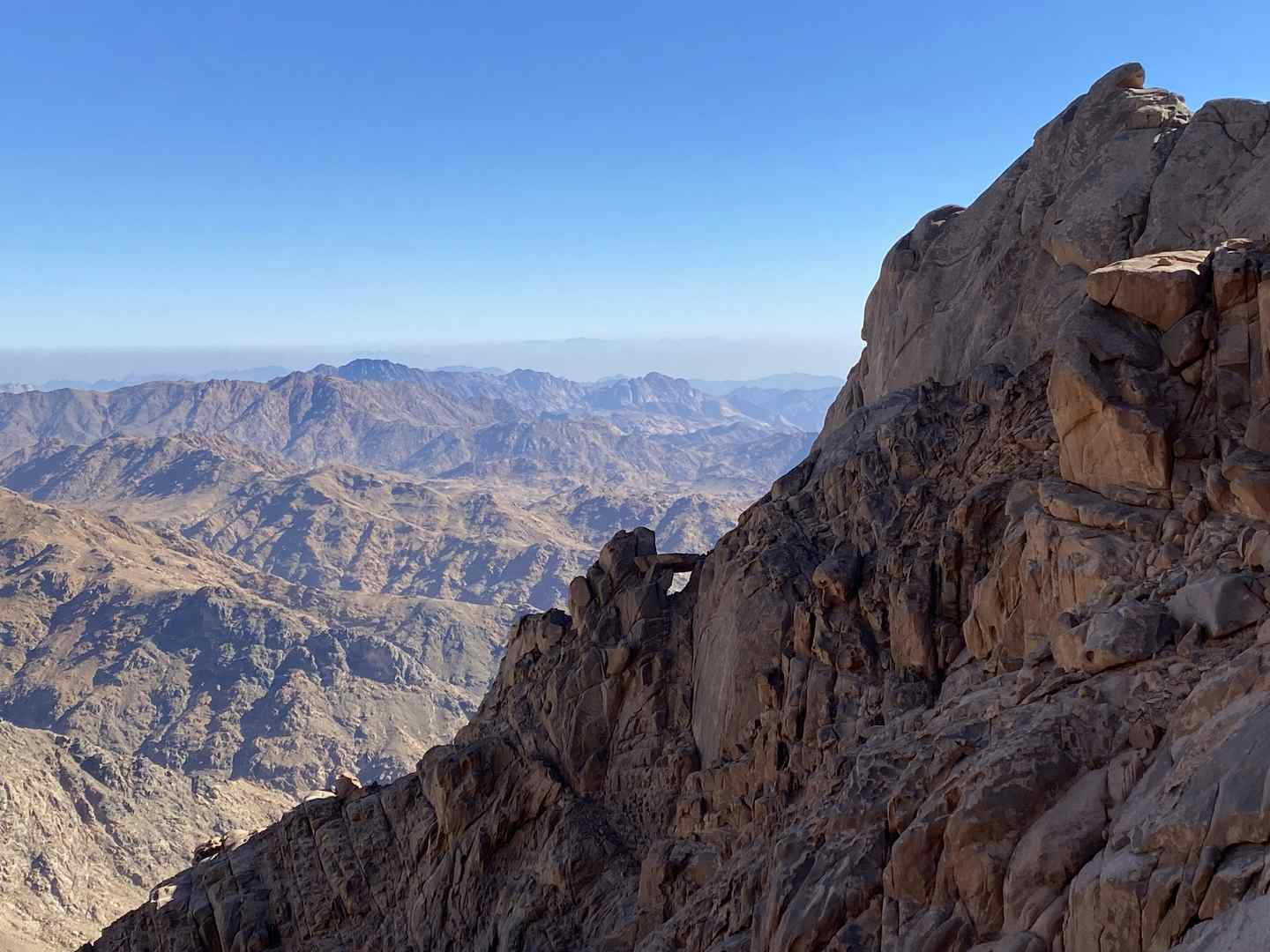
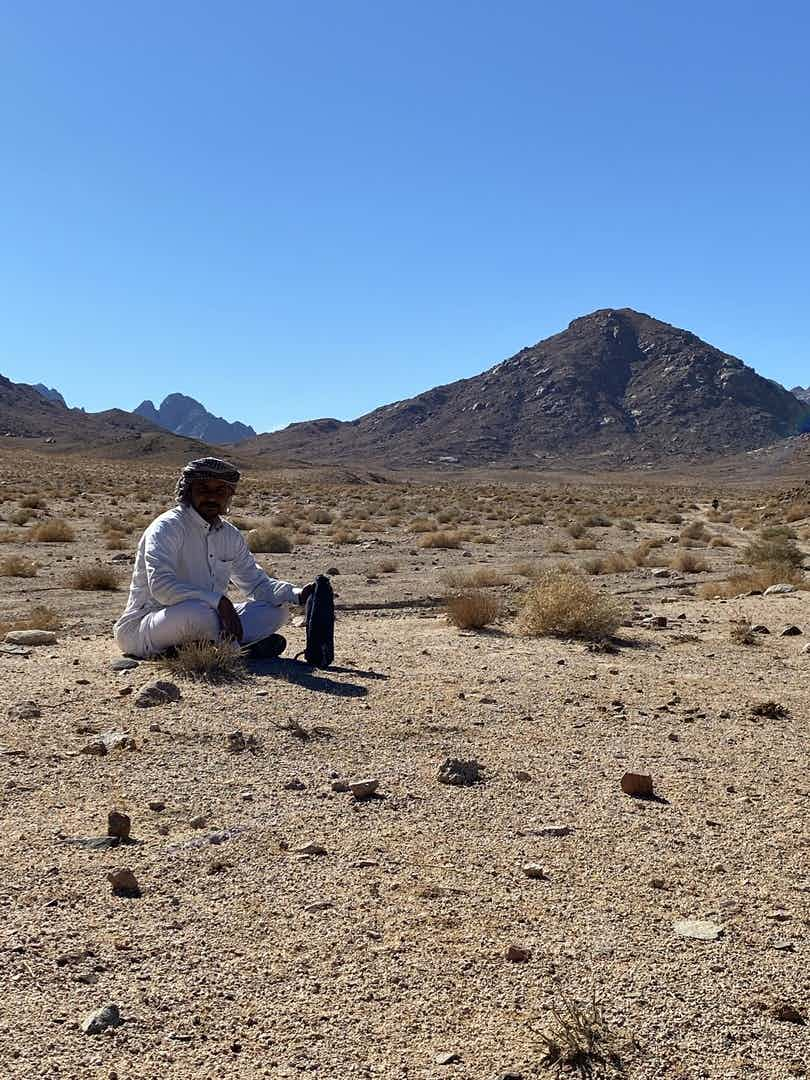
An amazing week off-grid
Such an amazing and educational experience. Tanis and Said are amazing guides supported by a real dream team of local Bedouins. Expect cold nights (bring extra layers and thermals if you are doing this hike ver the winter months), bonfires, amazing food and countless teas and cardamom coffees. Sleeping under the stars it's an indescribable experience, as well as it's scrambling up Jebel Um Shomer. I will keep these memories in my heart for a long time, and hope to be beck to magical Sinai soon!!
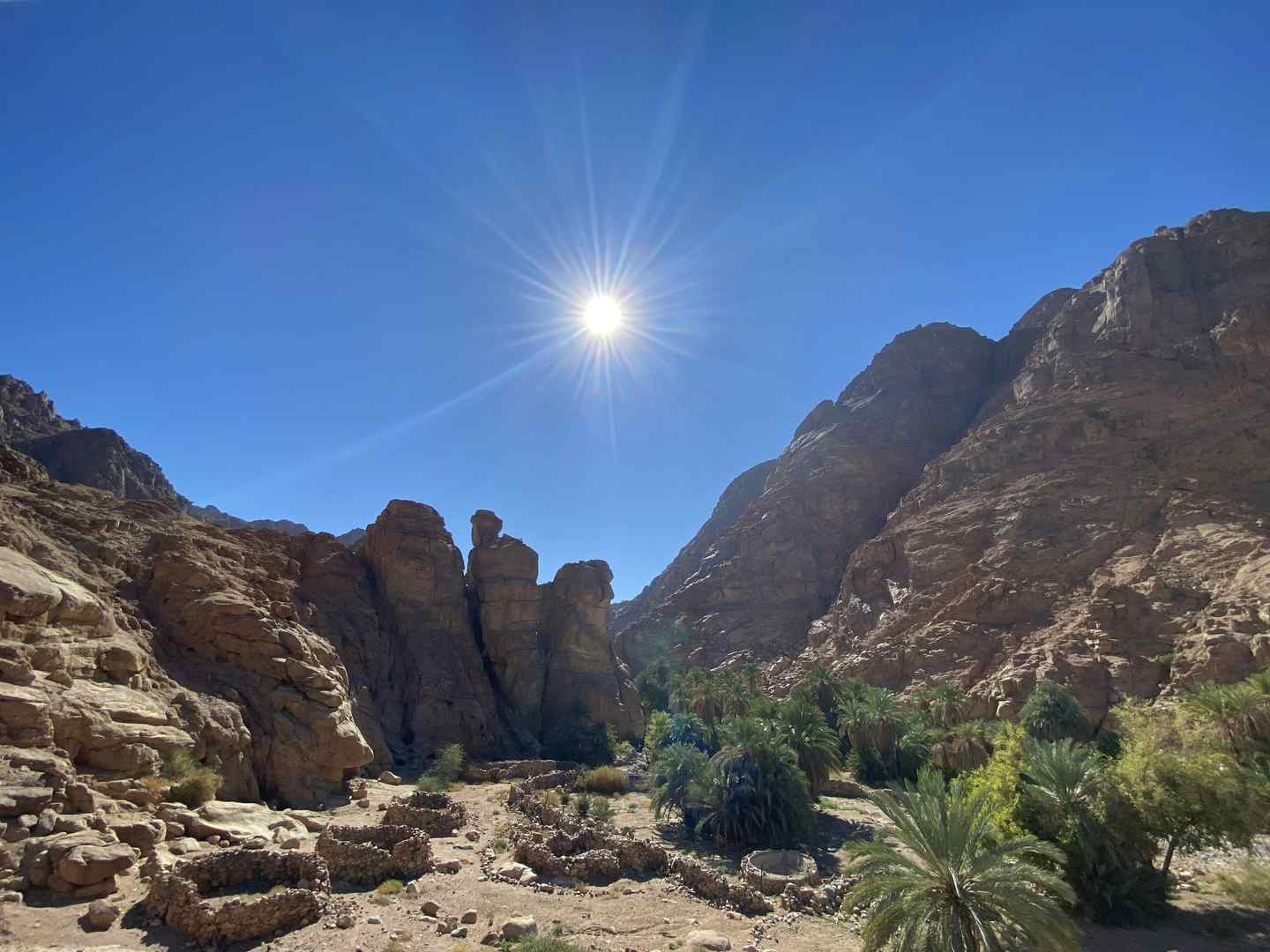
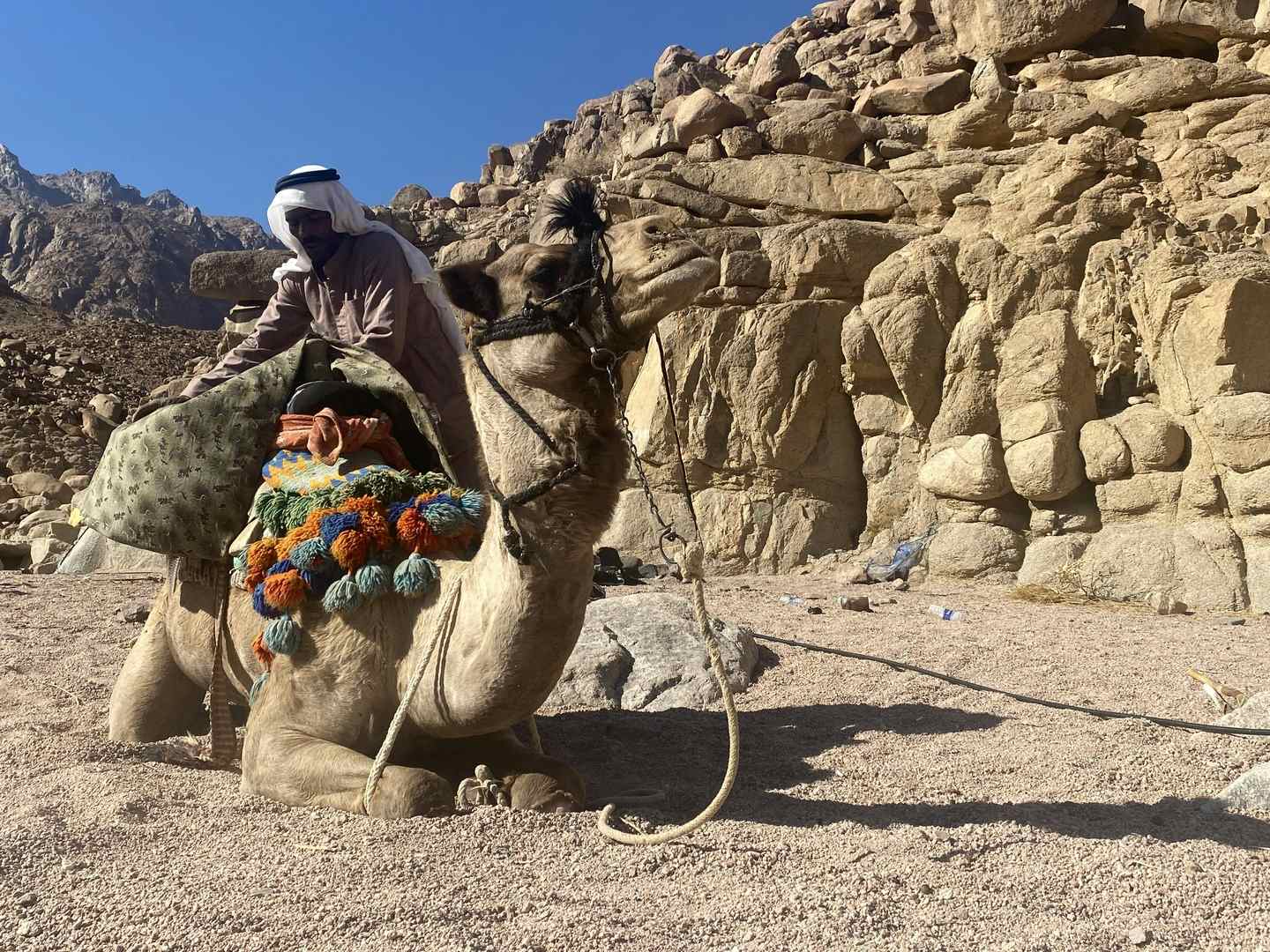
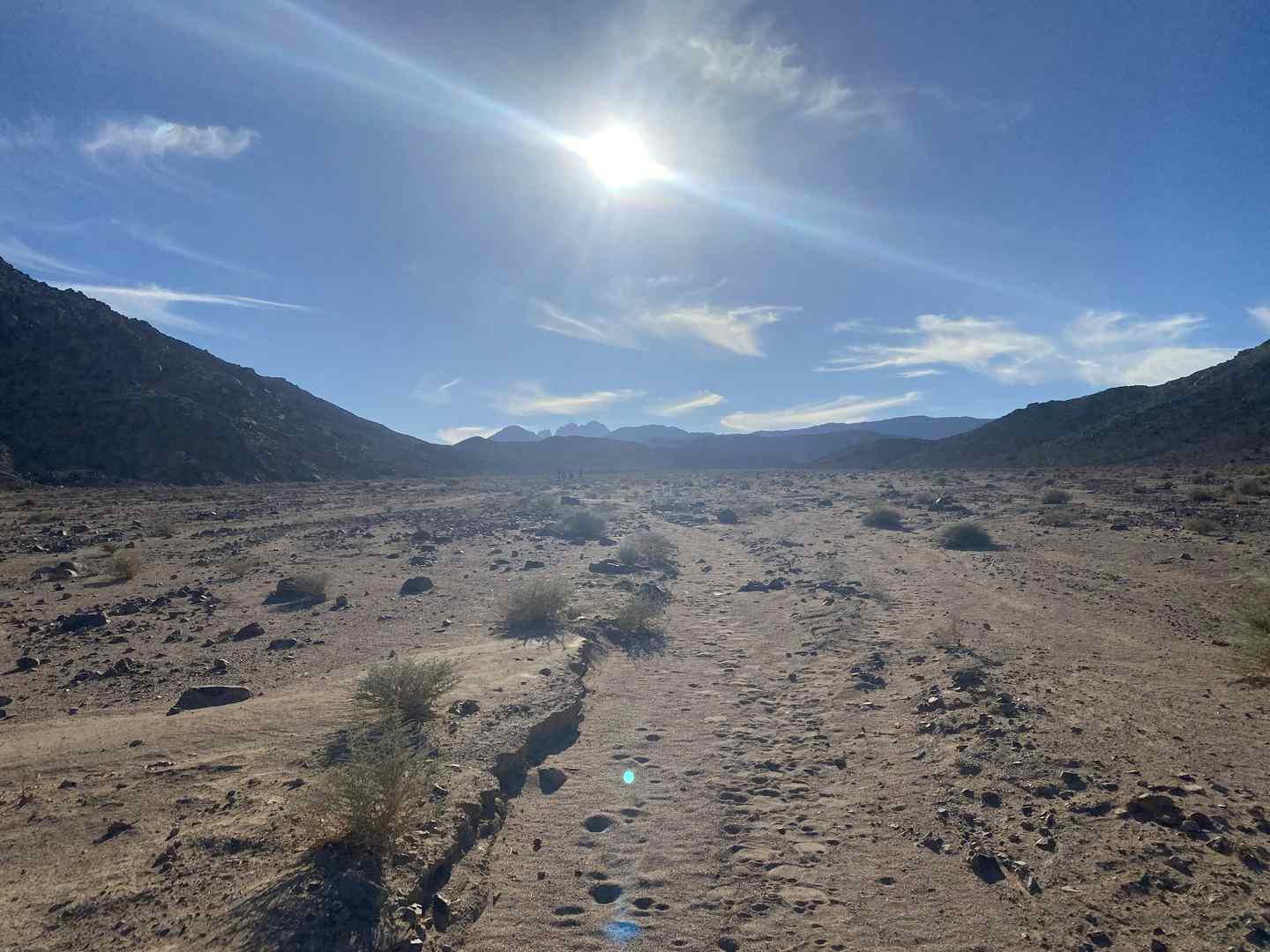
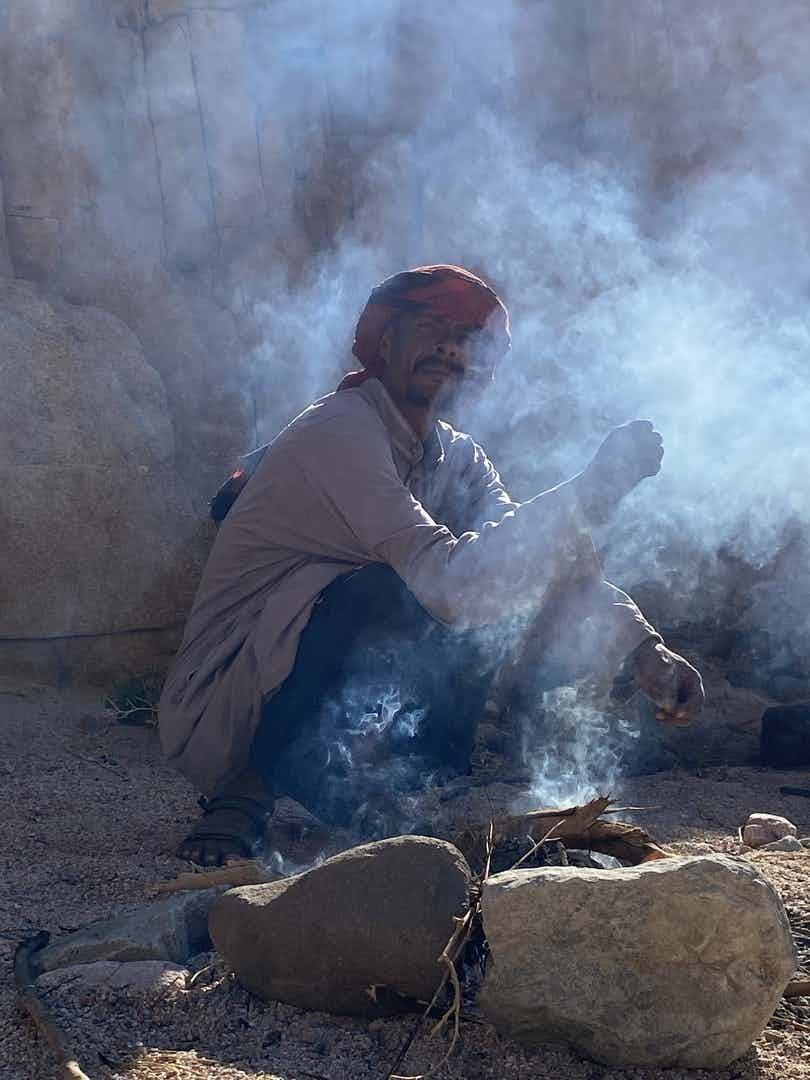
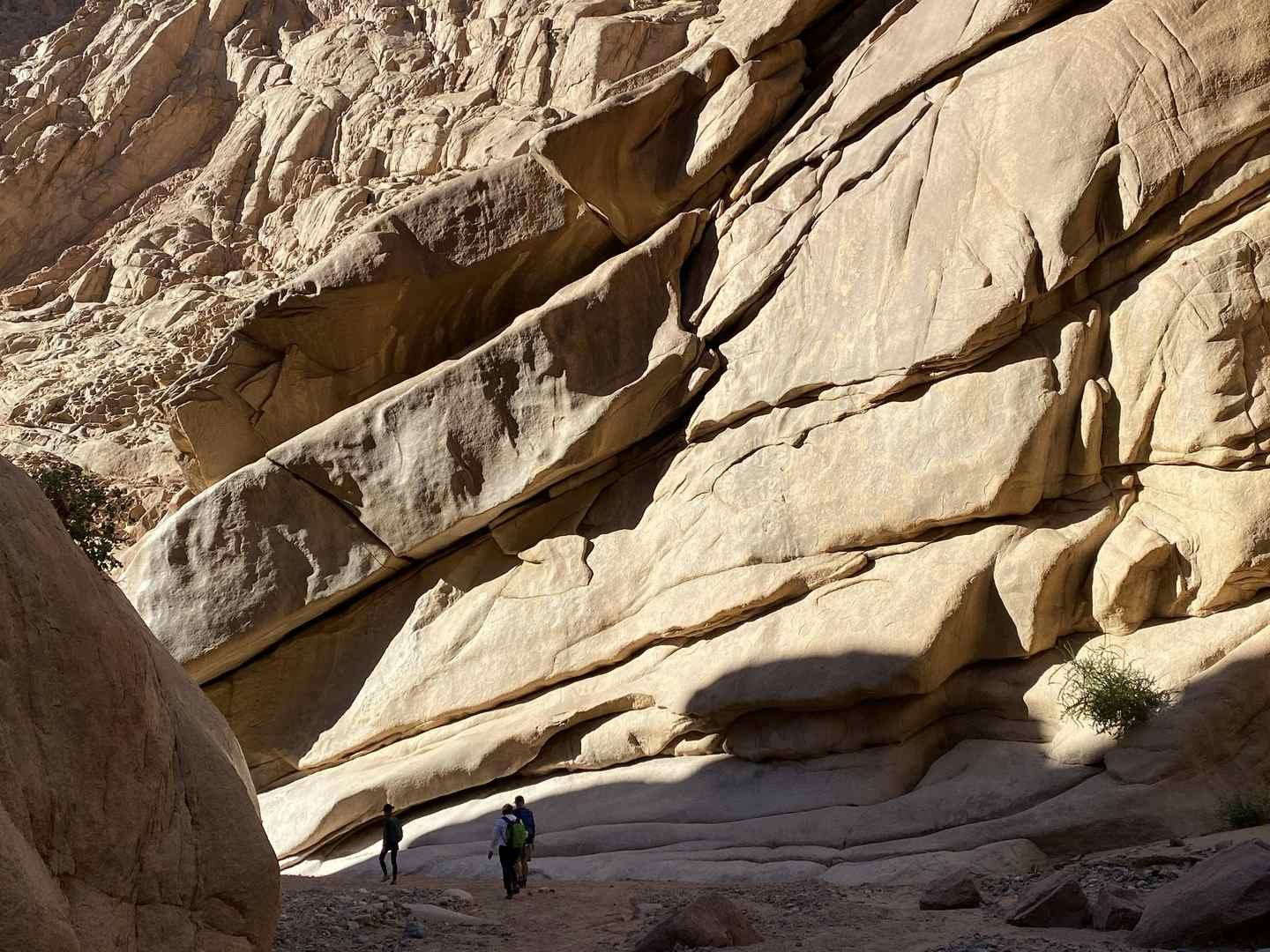
If you have ever wanted
If you have ever wanted to experience a desert trek this is surely one of the best places to do it, Tanis, Said & all of our guides, the locals we met along the way were very welcoming and brilliant hosts displaying the renowned Bedouin hospitality and are fantastic cultural ambassadors. The scenery is stunning and felt varied day to day, from dry river beds to canyons, scrambling up mountains, vast plains and oasis. Learnt a lot about the desert, its wildlife, fauna and history. A trip I wont forget, highly recommended.
Itinerary Activities
- 5 days of guided hikes through the Sinai Desert on Bedouin routes
- Plus a full day hike and scramble to summit of Um Shomer
Guides
- Expert, English-speaking Bedouin guide
- Bedouin camel guides
Accommodation
- 4 nights wild camping under desert skies
- 1 night homestay with a local Bedouin family
- 2 nights in a beachside hotel
Meals
All your meals are provided for the duration of the trip, many of which are cooked over fire for you. This includes:
- 7 Egyptian breakfasts
- 6 freshly prepared Bedouin lunches
- 7 tasty, traditional dinners
Transfers
- Arrival transfer from Sharm el Sheikh Airport at any time
- Departure transfer from Sharm el Sheikh Airport at any time
- Road and off-road transfers to and from the hike start/end points
Porterage
- Camels will carry your overnight luggage and main supplies during the desert trek
Equipment
- Warm blankets and carpets can be provided for wild camping in the desert
Our trips are hassle-free by design. We include all the activities and equipment, as well as many of the meals, so you can simply rock up with your rucksack and share the adventure with your new pals.
Travel to and from the trip
Our trips do not include flights, trains or other travel to the start point and back from the end point.
Tips
Tips are not included in the trip cost. These are entirely at your discretion and the amount should be reflective of your perception of service and quality - a tip is not compulsory and should only be given when you receive excellent service.
Travel insurance
Travel insurance is compulsory for all of our adventures and you are required to provide your policy information before departing. Your insurance should include adequate protection for overseas medical treatment, evacuation/repatriation, your baggage and equipment and the specific activities involved on your adventure. We also strongly recommend it includes cancellation and curtailment insurance, should you be unable to join your trip for specific reasons such as illness. Our recommended travel insurance provider is Campbell Irvine, as their insurance offers all of the above.
Visas
Most foreign nationalities entering Egypt require a valid visa. Some, including UK and US citizens, can get a full Egyptian visa on arrival at Sharm el Sheikh or Cairo airports. A single entry visa is US$25 and it's advisable to have the correct change in USD. You will see visa kiosks on entry to the terminal: line up and buy your visa stamps, then join the passport control queue.
If arriving into Egypt via the Israel/Taba border, if you are not eligible for a visa on arrival or if you would prefer to organise this in advance and avoid the queues at the airport, it is also possible to get an e-visa in advance from the official Egypt e-Visa portal.
If travelling into Sharm el Sheikh Airport, you may receive a free entry permission stamp upon arrival for stays within Sharm el Sheikh resort, however, travel to the eastern section of the trekking area on this trip requires a full Egyptian visa.
Personal Expenses
You know your own spending habits best, so please budget an appropriate amount for things like optional meals and drinks, shopping, optional activities, and laundry.
What's included?
- Carpets and warm blankets (if requested) for wild camping in the desert
- All group cooking equipment, cups and utensils
What do I need to bring?
BAGS
- Soft overnight duffel bag or rucksack (max. 15 kg)
- Daypack (20-30 litres)
CLOTHES
- Warm clothing for cold desert nights, but lighter clothes for warm daytime trekking
- Warm jacket plus fleece jacket or similar
- Thermals (for the cold evenings at end November, December to February; merino is best)
- Sun protection (hat/scarf, sunglasses)
- Buff or neckscarf
- T-shirts
- Lightweight long-sleeved shirt (for sun protection)
- Hiking shorts or trousers
- Broken-in hiking shoes
- Flip Flops or Sandals (for around camp)
- Underwear and socks
- Swimwear and beach clothes (can be left in Sharm whilst on the trek)
- Something to sleep in - thermals (as described above) will be needed for the desert.
SLEEPING
- Sleeping bag (Good quality - 4-season for end Nov-Feb; 3-season for Mar-Apr and Oct, Early Nov)
- Travel pillow or pillowcase
- Good camping mattress, puncture resistant, to insulate you from cold and hard ground
- Sleeping mask for nights when the moon is bright
- Warm beanie hat to sleep in
OTHER
- Pen (to complete your Landing Card at the airport)
- Universal travel plug adapter
- Power bank or solar charger (El Waara on Day 5 is the only recharging point on trek)
- Passports (and visas)
- Travel insurance documents
- Ear plugs
- Insect repellent
- Suncream
- Personal first aid kit, including rehydration salts, blister protection, ibuprofen, antiseptic cream, analgesic gel (e.g. Voltaren)
- Personal items (such as sanitary wear, lip balm and moisturiser due to dry climate)
- Sanitary supplies (toilet paper, biodegradeable wet wipes, and ziplock baggies to carry out)
- Travel sickness tablets (optional; the off-road drive to the trek start/end points can get bumpy)
- Quick-dry towel
- Walking poles (optional)
- Gaiters/Trail gaiters (optional - to stop loose stones/rocks getting into your shoes)
- Ties/carabiners for securing wet towels/clothing to pack during the day to dry
- Alcohol hand-gel
- Headtorch or torch
- 2 reusable water bottles x 1 litre each with a good filter or water purification tablets (essential)
- Energy bars and snacks - read our article on Best Hiking Snacks
Additional Night in Dahab Single Room
Payable Before Departure
Additional Night in Dahab Single Room
…
Additional Night in Dahab Twin/Double Room
Payable Before Departure
Additional Night in Dahab Twin/Double Room
…
Additional Night in Sharm El Sheik Double/Twin Room
Payable Before Departure
Additional Night in Sharm El Sheik Double/Twin Room
…
Additional Night in Sharm El Sheik Single Room
Payable Before Departure
Additional Night in Sharm El Sheik Single Room
…
Optional Private Room Upgrade (2 nights)
Payable Before Departure
Optional Private Room Upgrade (2 nights)
…
We partner with the World Land Trust to ensure this trip achieves Net-Zero emissions. We also support their Buy an Acre programme, helping local communities to buy and protect natural habitats in perpetuity.
What's the number?
It works out on average at 198kg of CO2 emissions per person, including all local transport, accommodation, food, activities, guides, staff and office operations.
The only thing it doesn’t include right now is flights and travel to the destination. We do make an overall estimate across all our customers separately, but as we don’t book flights, have customers from all corners of the world, and no way of reliably knowing their travel plans, we simply can’t include an individual number in the figure on display here. We’ve got a goal to fix that, so that when you book, there is a way to measure and mitigate the carbon emitted by your flight too.
But what does the number mean?
Yep, hard to picture eh? To give you an idea:
- Driving 1000 miles/1609km would be approximately 281kg of CO2 in an average car (or 140.5kg per person, if there were two of you in it).
- A return economy class flight between London and New York would be approximately 1619kg (1.66 tonnes) per person.
- 10 trees in a temperate forest are estimated to remove approximately 250kg of CO2 from the air in a period of 5-10 years.
What are we doing about it?
Our trips are relatively low-carbon by design, and we're working with all our hosts to develop long term carbon reduction plans. We partner with the World Land Trust to ensure this trip achieves Net-Zero emissions. We also support their Buy an Acre programme, helping local communities to buy and protect natural habitats in perpetuity, ensuring the protection of the reserve and its wildlife.
Want to know more?
Amazingly, no international travel company has ever publicly published their carbon measurements before, as far as we know. We believe that must change, quickly. So we’re openly sharing the method we used in the hope that other companies will be able to more easily follow suit and build on what we've done so far. You'll find it all here.
Marta Marinelli, raised in Italy’s serene Prosecco Hills, dreamt of global adventures, inspired by her father's travel stories. Her passion evolved into a career, backed by a decade of studies including degrees in international tourism and destination management. She’s worked in the adventure travel sector since 2012, living in Italy, the UK, and now sunny Portugal.
Over twenty years, Marta has explored over 55 countries, visiting remote areas like Ghana, Rwanda, Sao Tome and Principe, Haiti and Nepal’s Upper Mustang region. As a Senior Adventure Expansion Manager at Much Better Adventures, she focuses on creating life-changing experiences, ranging from multi-activity adventures, challenging treks to ultimate adventures in iconic places. She loves the challenge of finding the best local adventure hosts around the world, collaborating on adventures that offer genuine immersion, pushing beyond the beaten path and working on exclusive itineraries that challenge your comfort zone.
What makes her tick? Enabling people to live adventure-rich lives while positively impacting and empowering local communities around the world, generating sustainable opportunities for both the host, guides, community, and the environment.
We suggest avoiding ice and any cold drinks made from untreated local water, even in Sharm. Water will be provided throughout the trek and carried by camels and Jeeps, often taken from natural sources in the desert. This will be boiled where necessary, but we do suggest bringing water purification tablets or a different purification system for extra safety. We encourage you to bring a refillable bottle to avoid plastic waste; check out our article on water filtration systems for more information.
Out in the desert, you'll join a team of Bedouin guides who were born and raised in the area and know how to guide you through the remote desert environment safely and expertly. One of the unexpected highlights of the trip is watching how the Bedouins move through the desert, organise camps and cook according to ancient traditions. This is an incredible opportunity to fully immerse yourself in the local culture and get to learn survival skills from the Sinai’s original nomadic people.
This trip includes five nights of wild camping under the stars – your Bedouin team will set up the cooking area and make a fire at each location. You'll sleep under warm blankets or in your sleeping bag, with no tents or shelters. Washing will be predominantly done with wet wipes – there won’t be any showers until you reach Sharm El Sheikh.
For toilets, you can find a convenient boulder or dig a small hole, as the exceedingly dry temperatures of the desert disintegrate waste rapidly. Biodegradable paper can be burnt on the fire and you will need to carry any extra waste in ziplock bags. Your host will give you a full briefing on the etiquette and practicalities of outdoor toileting. Whilst this is all part of a wilderness adventure, it can have a negative impact on the surrounding environment, if not practiced carefully. For those who have periods, we have also written a handy guide, to help you manage these whilst adventuring.
There is no phone signal throughout the desert trek. Please let your loved ones know so that they don’t worry. You can give them this number for emergency calls: +20 1004040181.
You need to bring your own sleeping bag: 4-season (Dec-Jan-Feb, End Nov) or 3-season (March-April and Oct-Early Nov), as well as a travel pillow (recommended) and a good camping mattress (puncture resistant) to insulate you from cold and hard ground. Some extra thermal layers and a warm beanie hat are recommended for departures in the winter.
If you wish to extend your trip in Sharm El Sheikh, you can book any optional extra nights via your host (see Optional Extras for more info). Alternatively, you can also consider heading north to Dahab, an amazing adventure destination where your local host is a true activity specialist, offering a wide range of extra tours such as bouldering, climbing, diving and mountain climbing. Just reach out to them prior to your trip and they'll be happy to provide any information and arrange extra services for you. If you wish to head to Cairo and the Pyramids, the easiest way is to fly from Sharm El Sheikh to Cairo (one hour). There is also a bus connecting Sharm to Cairo which departs four times daily and takes approximately eight hours (see go-bus.com or bluebus.com).
Most foreign nationalities entering Egypt require a valid visa and most can get this on arrival. Please get a full Egyptian Visa which is $25 on arrival at Sharm El Sheikh or Cairo airports (advisable to have exact USD change). You will see visa kiosks on entry to the terminal: line up and buy your visa stamps, pick up your landing card, then join the passport control queue. If arriving into Egypt via the Israel/Taba border, if you are not eligible for a visa on arrival or if you would prefer to avoid the Visa stamp queues at the airport, get an e-visa in advance from the official Egypt e-Visa portal https://visa2egypt.gov.eg/eVisa/ . If travelling into Sharm el Sheikh Airport, you may receive a free entry permission stamp upon arrival, however, travel to the eastern section of the trekking area on this trip requires a full Egyptian visa. If you are not a UK/EU citizen, some nationalities must obtain a Visa before arrival from the Egyptian embassy in your country. If in doubt, please ask.
In Egypt, it is a legal requirement for all hotels and tourism operators to take a copy of guests' passports (or local ID for domestic travellers), which they must submit to the tourist police.
In addition, your host must submit a copy of your passport to the National Park authorities for permission to travel in the area visited on this trip. The application for this permission must be completed at least a day in advance, so your host asks for these in advance of travel to ensure trip preparations are complete in time for your arrival. Passport scan copies held by Much Better Adventures are deleted after your trip has finished.
Yes. Trips to Egypt have been running as normal since the Israel conflict escalated in October 2023, and again in June 2025 – check out our latest customer reviews! Much Better Adventures operates trips in line with British FCDO travel advice and also consults with security advisers, both of whom have confirmed that trips are safe to run. We continue to receive real-time updates from the FCDO, and our local host in Egypt will inform us immediately should anything change locally. If you have any questions, we've prepared some additional information about travel to Egypt during the Middle East Conflict.
For current advice about travelling in Egypt, have a read of the FCDO pages here.
This trip operates in the South Sinai area of Egypt. All activities take place in FCDO green zone area from the Nuweiba-St Catherine-Fieran Road south, and west to the sea.
This trip visits locations at or above 2500m, where some people may experience symptoms of Altitude Sickness, also known as Acute Mountain Sickness (AMS).
Previous experience at altitude doesn’t guarantee the same response again – your body can react differently on each trip. However, having been at altitude before is still valuable: it gives you a better understanding of how your body might respond, what symptoms to look out for, and how to manage your pace and energy levels.
Your guide is trained to manage the risk of altitude sickness by controlling the rate of ascent, monitoring group wellbeing, and responding appropriately if anyone feels unwell.
Before booking, we recommend considering your personal health, particularly if you have any pre-existing conditions, and consulting a medical professional if you’re unsure. Arriving early to allow your body to acclimatise can also make a big difference.
Your travel insurance must cover the maximum altitude reached on this trip and include emergency evacuation.
This trip operates in areas where daytime temperatures can reach extreme highs, where limited shade and high humidity can also be a factor. These conditions can affect physical performance and increase the risk of dehydration or heat-related illness. Your guide will adjust the pace and monitor the group closely, but hydration, proper clothing, and sun protection are essential.
Before travelling, consider your ability to be active in high temperatures and consult a medical professional if you have concerns – especially if you have any cardiovascular or heat-sensitive conditions. Arriving a day or two prior to the trip may help you adjust gradually to the heat.
Sure can! Over 70% of our travellers travel solo, it’s a great way to meet like-minded people.
Our team of Adventure Hunters co-create exclusive adventures which are run by highly vetted, specialist hosts. The trip is run by our trusted host partner in the destination. We only work with independent, local, in-destination experts who know the very best places to explore and how to stay safe. Read more information about the local teams we partner with. You’ll be introduced to the host straight after making a booking via the Much Better Adventures platform.
Much Better Adventures refer to the UK Government’s official travel advice when designing trips and monitoring trip operations. We recommend that all customers are familiar with the practical information provided on the Government’s FCDO website, where current travel advice can be found by searching for the applicable destination(s).
For customers joining this trip from other international destinations – please also read the official travel advice applicable to your country of residence/origin, as this may differ.
We recommend checking out the country-specific information and also talking to a travel nurse.
We automatically convert prices from the local currency that a host receives to your chosen currency. We update our exchange rates on a daily basis so this does mean that prices displayed on the site are subject to currency fluctuations, which is why you may see them change over time.
If you wish to change the currency you pay in, head to the bottom of the page.
All of our group adventures are specially designed for adults to enjoy as we want these adventures to bring together outdoorsy people who are truly like-minded. You must be over 18 to join one of our trips.
You're always in good company on one of our adventures.
Our trips are typically made up of a mixture of solo travellers and small groups of 2 or 3 friends, with most in their 30s-50s.
Our sociable adventures are solo-friendly by design and naturally attract outdoorsy people with a shared mindset; a love for adventure, a desire to push themselves and meet awesome, like-minded people along the way.
It’s this camaraderie that has so often turned a great adventure into a life-changing one.
Don't just take our word for it:
- 95% of people rate the group dynamics on our trips 5/5
- 90% of people recommend joining a trip to make new friends
- 75% of people have met people on our trips that they would now consider friends
See here for more info about the Much Better Adventures tribe.
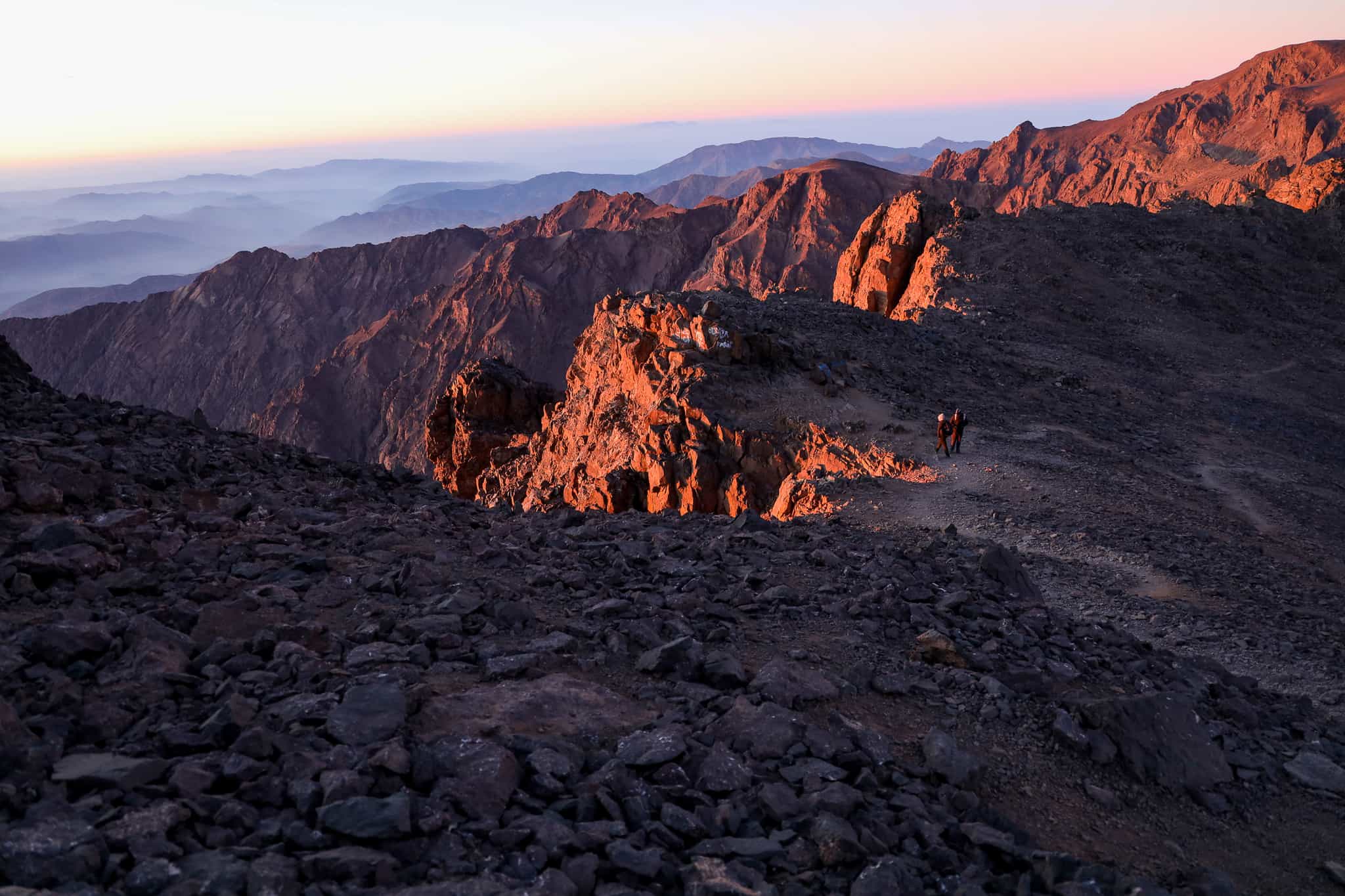
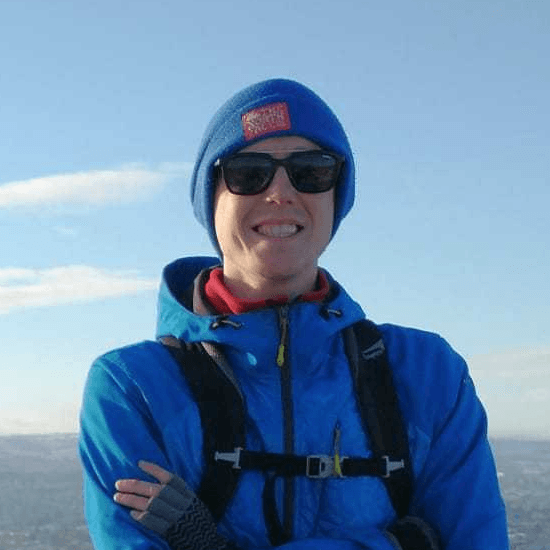
Need help finding flights?
From logistics and how to get there, to fitness, group dynamic and trip difficulty, Rory and his team of friendly experts are on hand to help.
We've got your back
Guaranteed to run
All Much Better Adventures trips are now guaranteed to run. Once you’ve booked your spot you can immediately make your travel arrangements, no uncertainty, no hanging about (excludes 'request to book' departures). Full details
Flexible payments
Secure your spot with the minimum deposit and pay off the remaining balance in as many instalments as you like, with no interest or fees. Full details
Happiness Guarantee
We’re so confident you’ll have an amazing time we’ll put our money on it. Full details
Full financial protection
To give you complete peace of mind Much Better Adventures is backed by ABTOT, ABTA and ATOL memberships. Full details
Tried & Trusted
Much Better Adventures is rated ‘Excellent’ on Trustpilot with over 1000 verified trip reviews averaging 4.8/5.
Connect before you go
You'll be invited to join a WhatsApp group to get to know each other before your big adventure together. Full details
DEPARTURE DATES
Saturday 18th October 2025
to Saturday 25th October 2025
